YILKAL GEBEYEHU HAS SUCCESSFULLY DEFENDED HIS PhD DISSERTATION
The topic of the dissertation was Remote Sensing Based Evapotranspiration Modelling for Irrigation Performance Assessment in Jedeb Watershed, Upper Blue Nile Basin, Ethiopia.
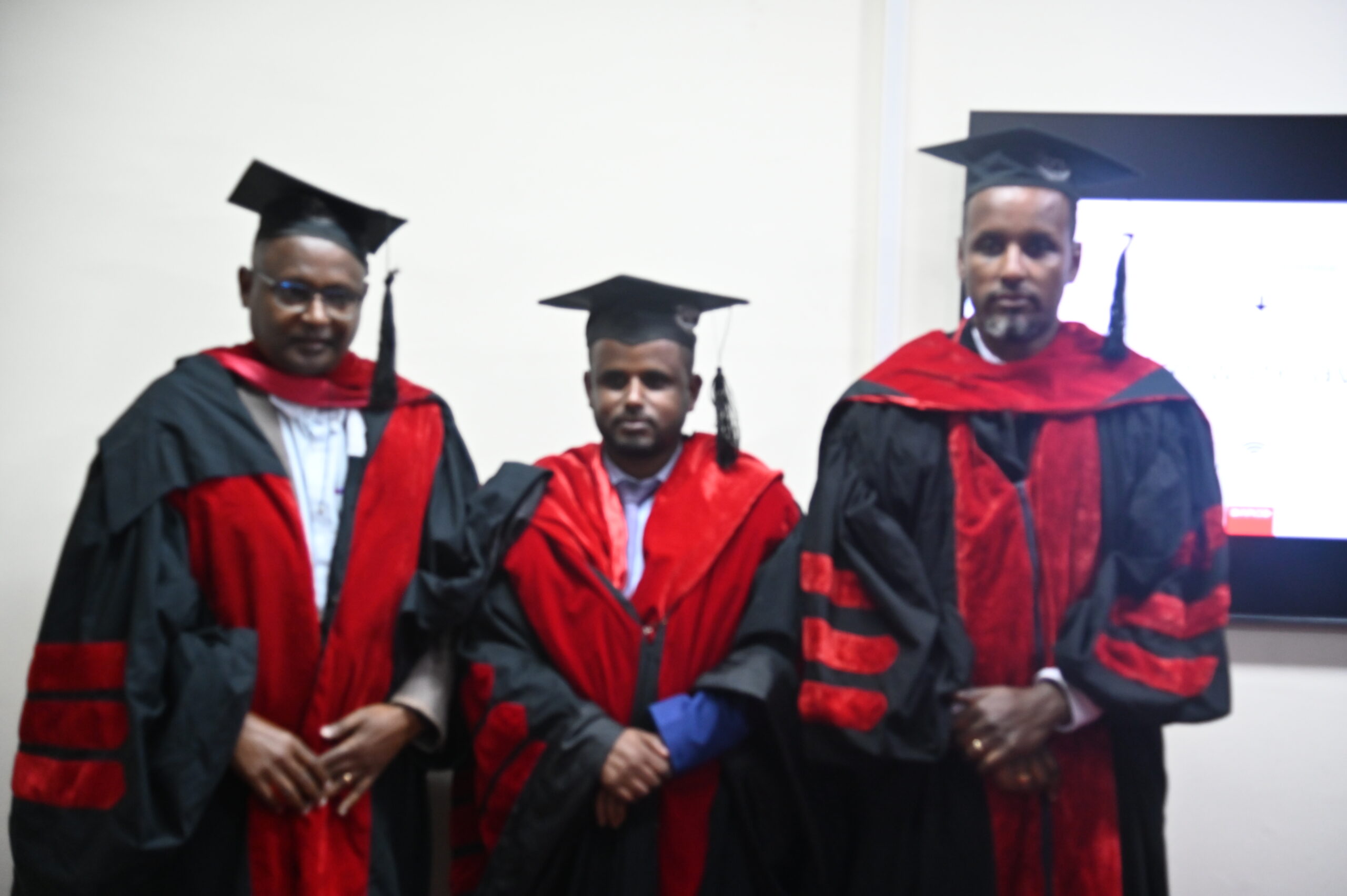
AccurateETa and irrigated area maps are important in assessing irrigation performance to improve water resource management. Yilikal’s study compared GEE machine learning algorithms for irrigated area mapping, customized the SEBALI model using high-resolution LULC and Python, and evaluated the performance of a small-scale irrigation scheme using remote sensing in the Jedeb watershed, Upper Blue Nile.
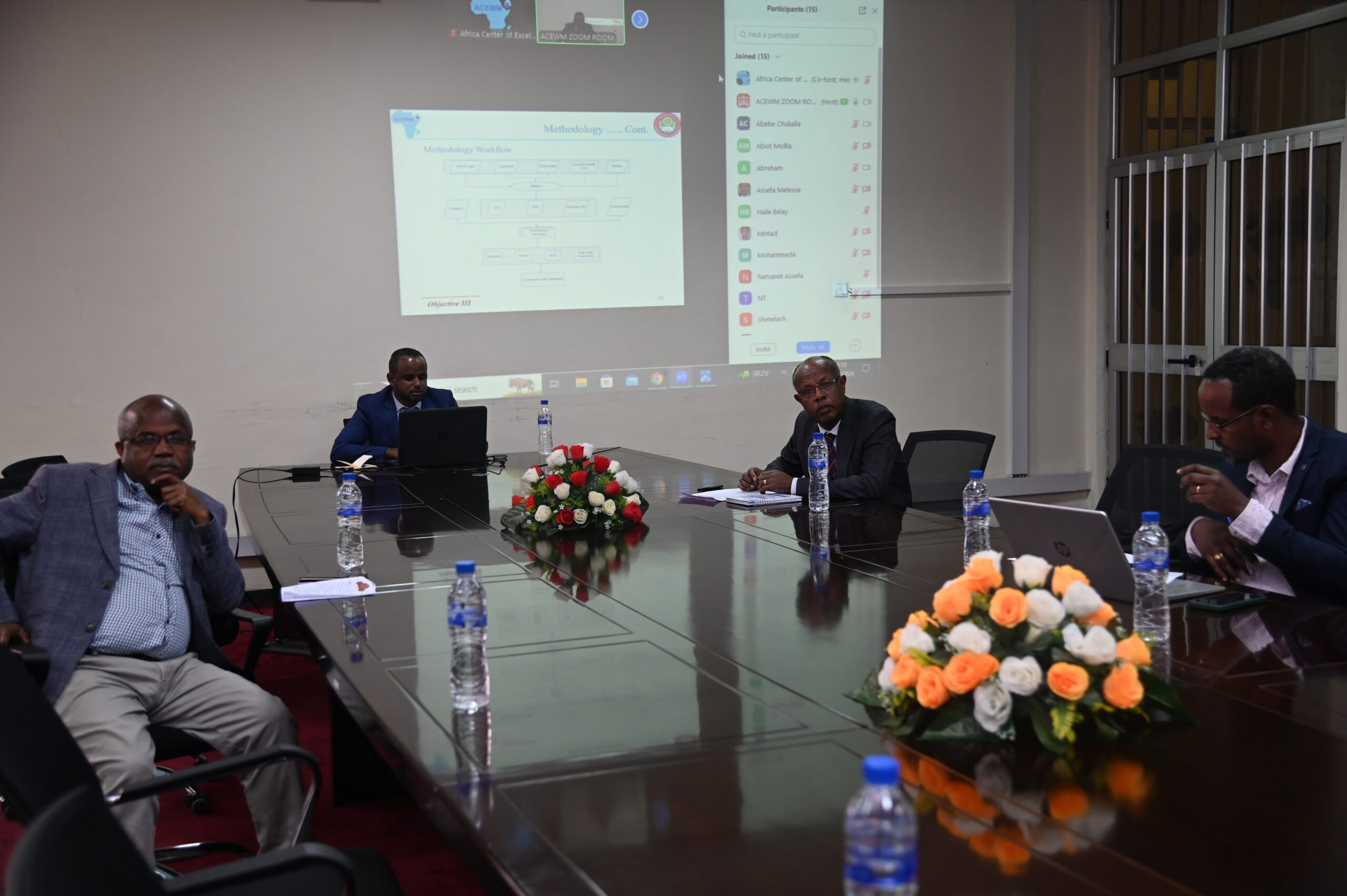
Yilikal said the main inputs of the study were Sentinel-1, Sentinel-2, Landsat 8, and ERA5 reanalysis data. Random Forestclassifier found consistent in mapping irrigated areas. SEBALI was validated using ETa fromEC, SWAT+ model, and WaPOR. SEBALIGEEpy provides accurate ETa with fewer missing records. Shimburit scheme showed good equity and satisfactory water distribution among fields and within the field with OCR of 0.54 and 0.43 and mean CWP of wheat estimated 2.49 kg/m3 for the two seasons. The study showed the potential of remote sensing to evaluate irrigation performance and water productivity per field within smallholder irrigation schemes.
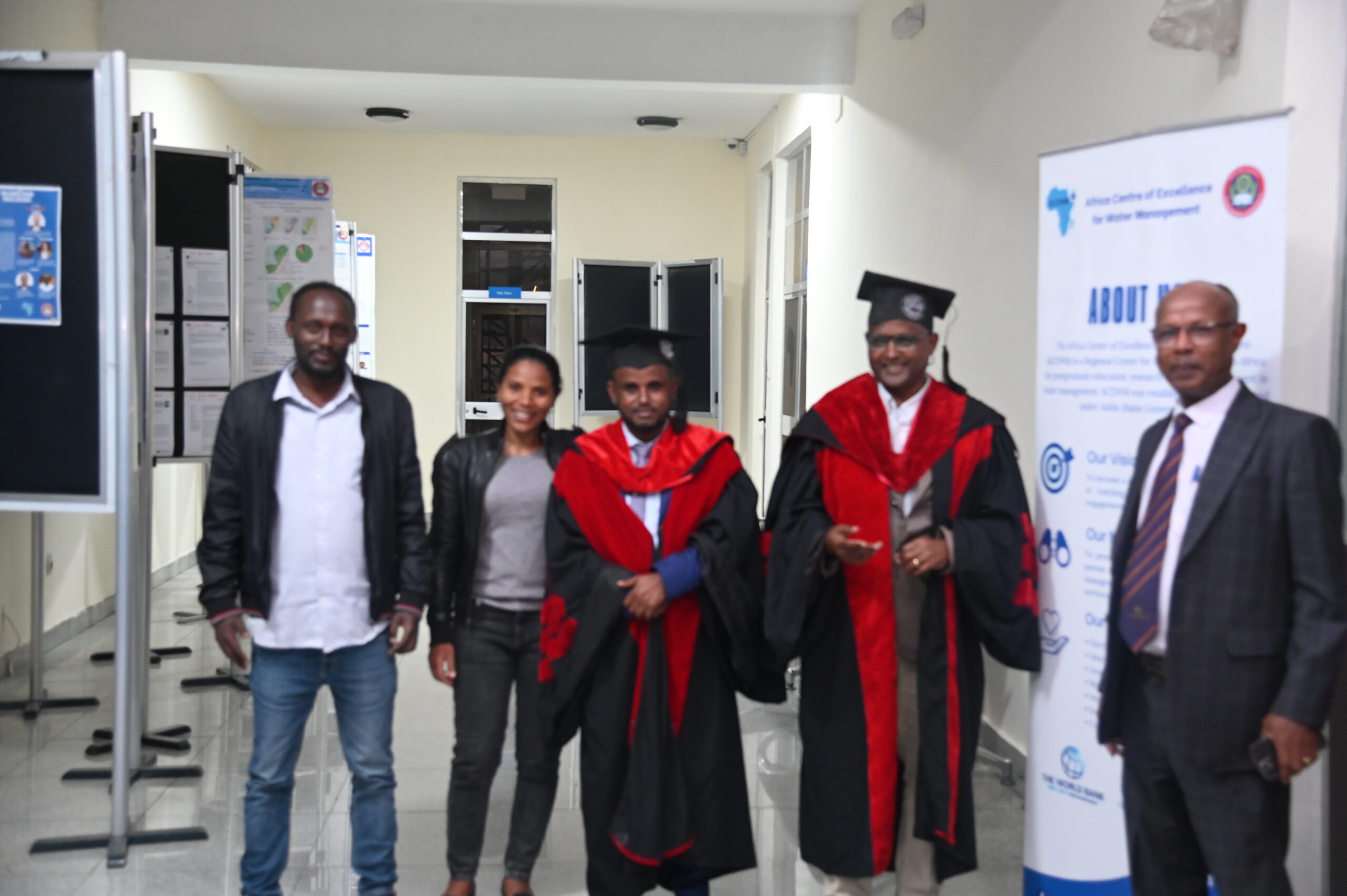
Prof. Feleke Zewge chaired the defense session, with Dr. Tena Alamirew from Addis Ababa University, as the main supervisor and Dr. Abebe Demissie from IHE Delft Institute for Water Education, Delft, and The Netherlands as co-supervisor.
Dr. Zeleke Agide from Addis Ababa University and Prof. Assefa M. Melesse, from Florida International University, served as internal examiner and external examiners, respectively.
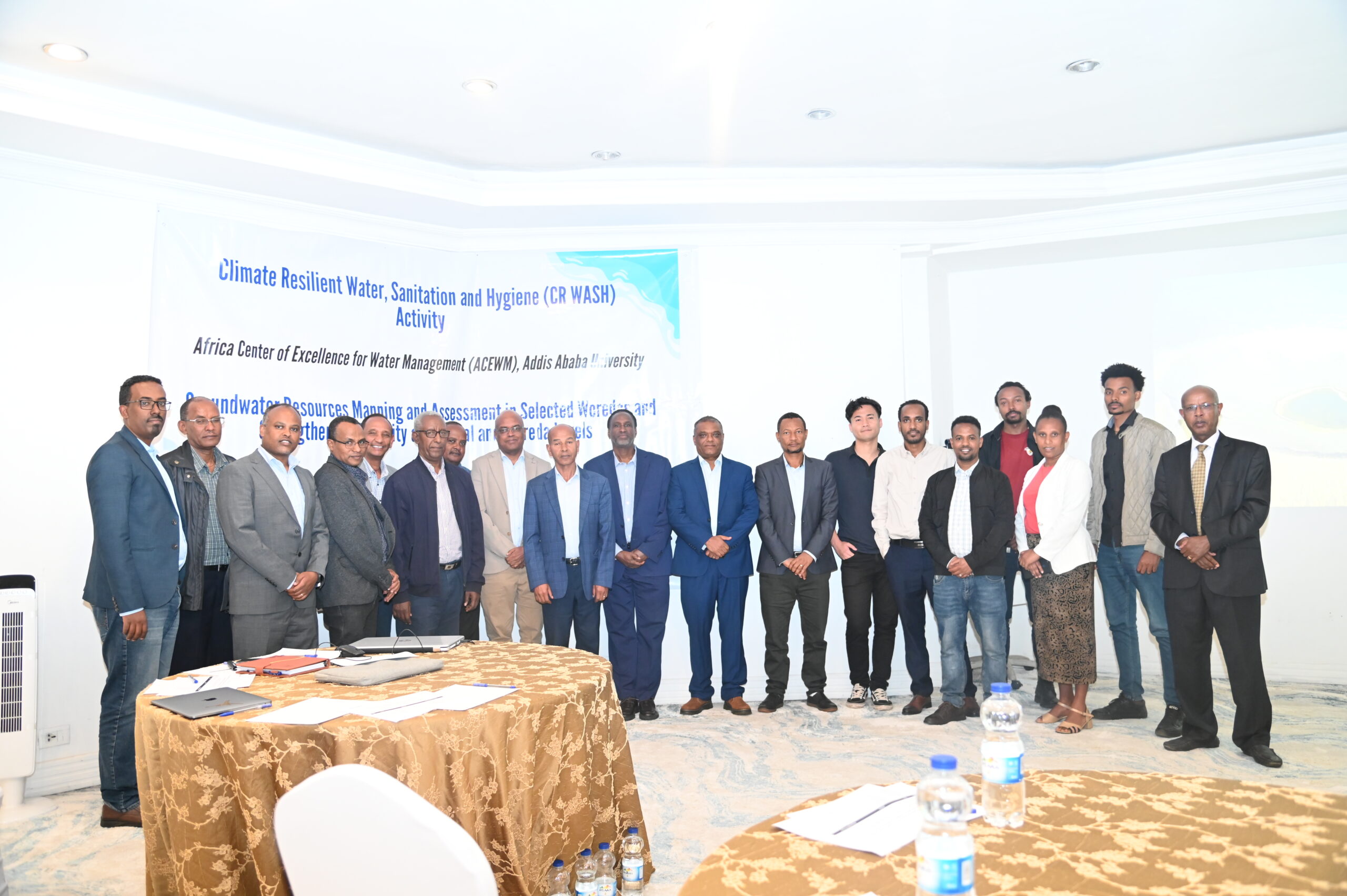
The Consultative Workshop entitled “Groundwater Resources Mapping and Assessment in Selected Woredas and Strengthening Capacity at Regional and Woreda Levels” marked a significant step in addressing the critical issue of groundwater management in the region. With key participants, including representatives from Africa Center of Excellence for Water Management, Climate Resilient Water, Sanitation and Hygiene (CR WASH) Activity, UNICEF, and the FDRE Ministry of Water and Energy, the workshop brought together a diverse group of stakeholders dedicated to enhancing water resource management.
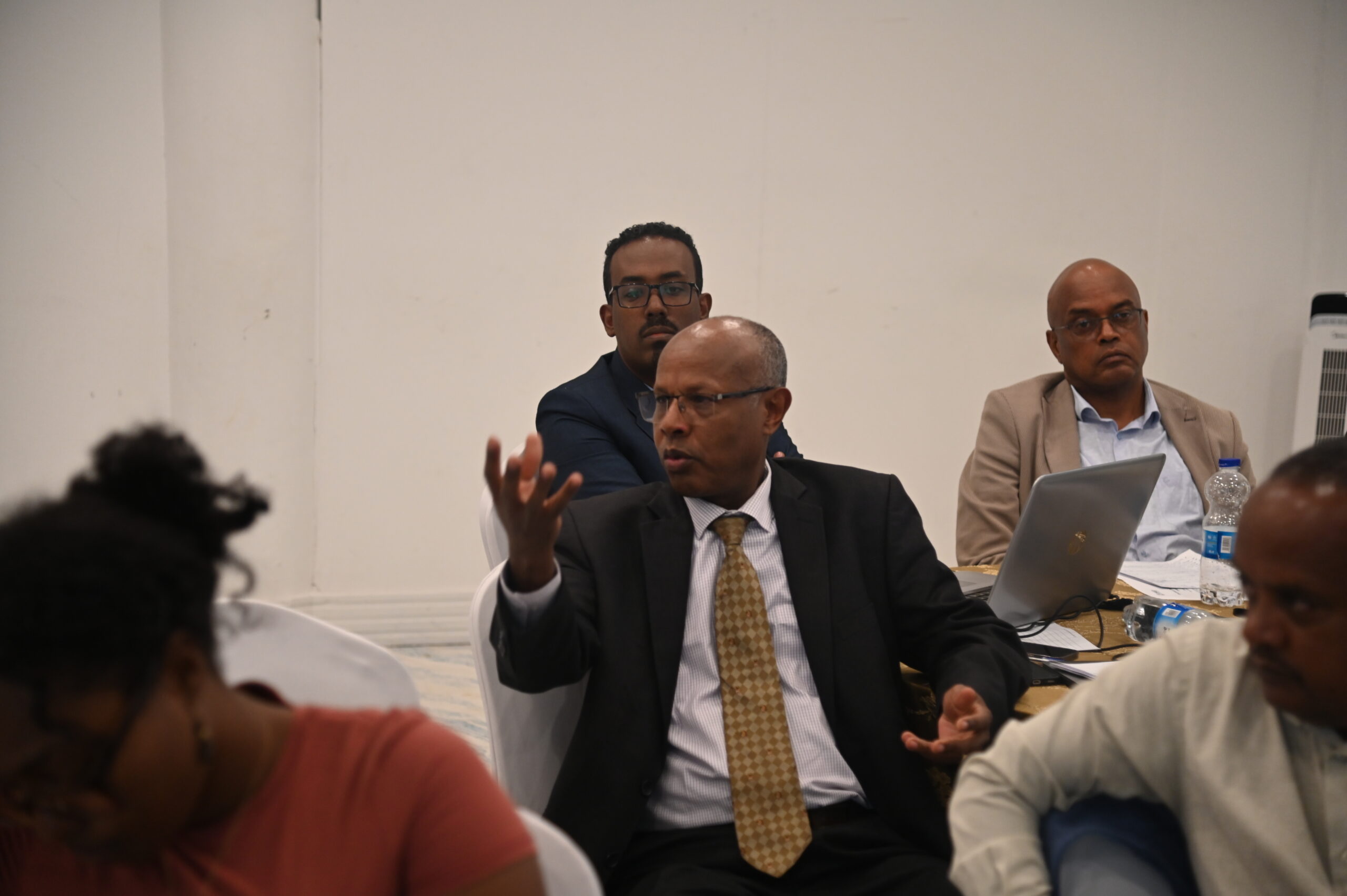
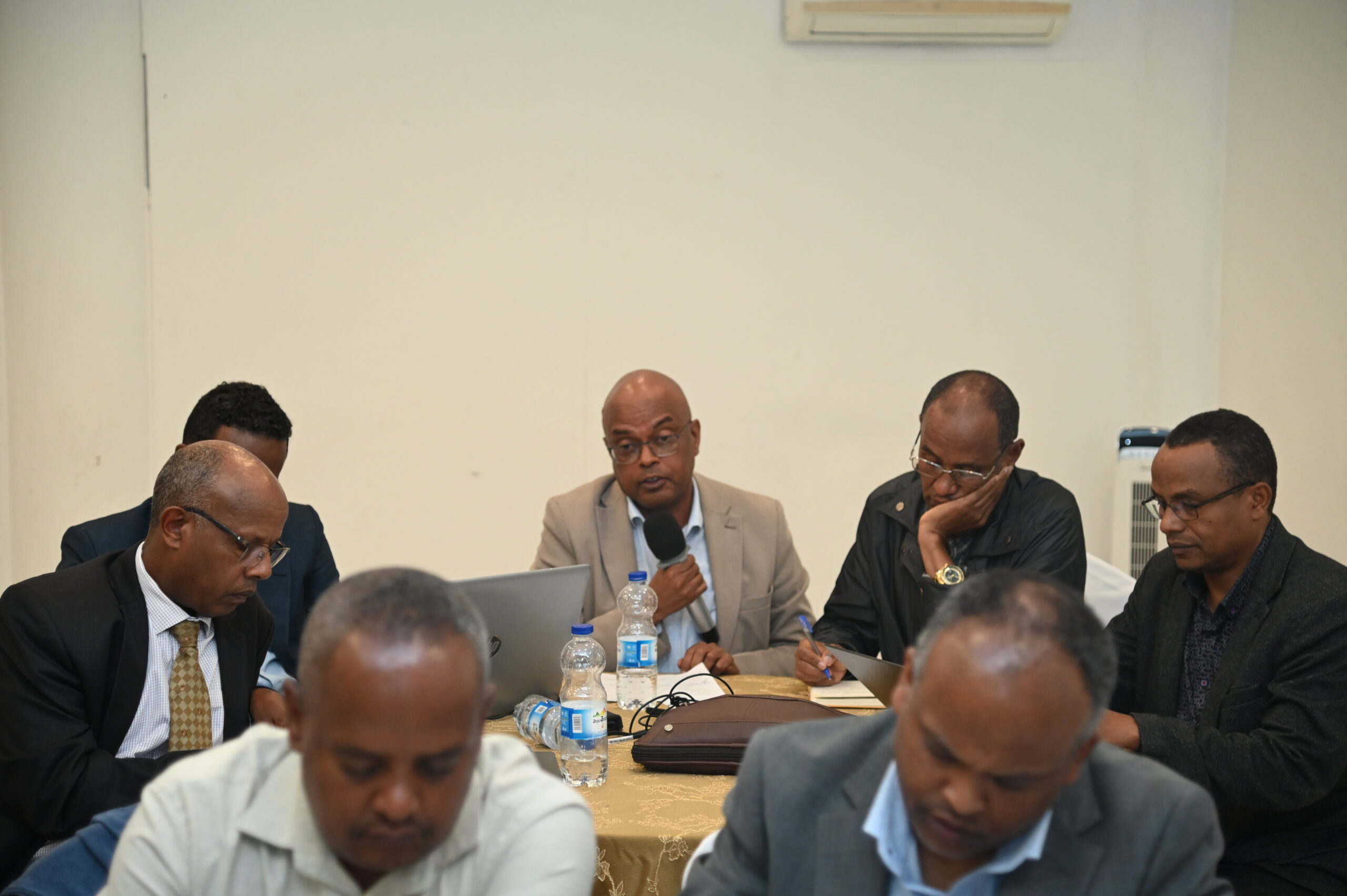
Groundwater is a vital resource, particularly in regions where surface water sources are scarce or unreliable. As climate change exacerbates water scarcity and affects rainfall patterns, the need for sustainable management of groundwater becomes increasingly urgent. This workshop focused on mapping and assessing groundwater resources, which is essential for informed decision-making and resource allocation. Accurate mapping provides valuable insights into the quantity, quality, and distribution of groundwater, allowing local authorities to manage this resource effectively.
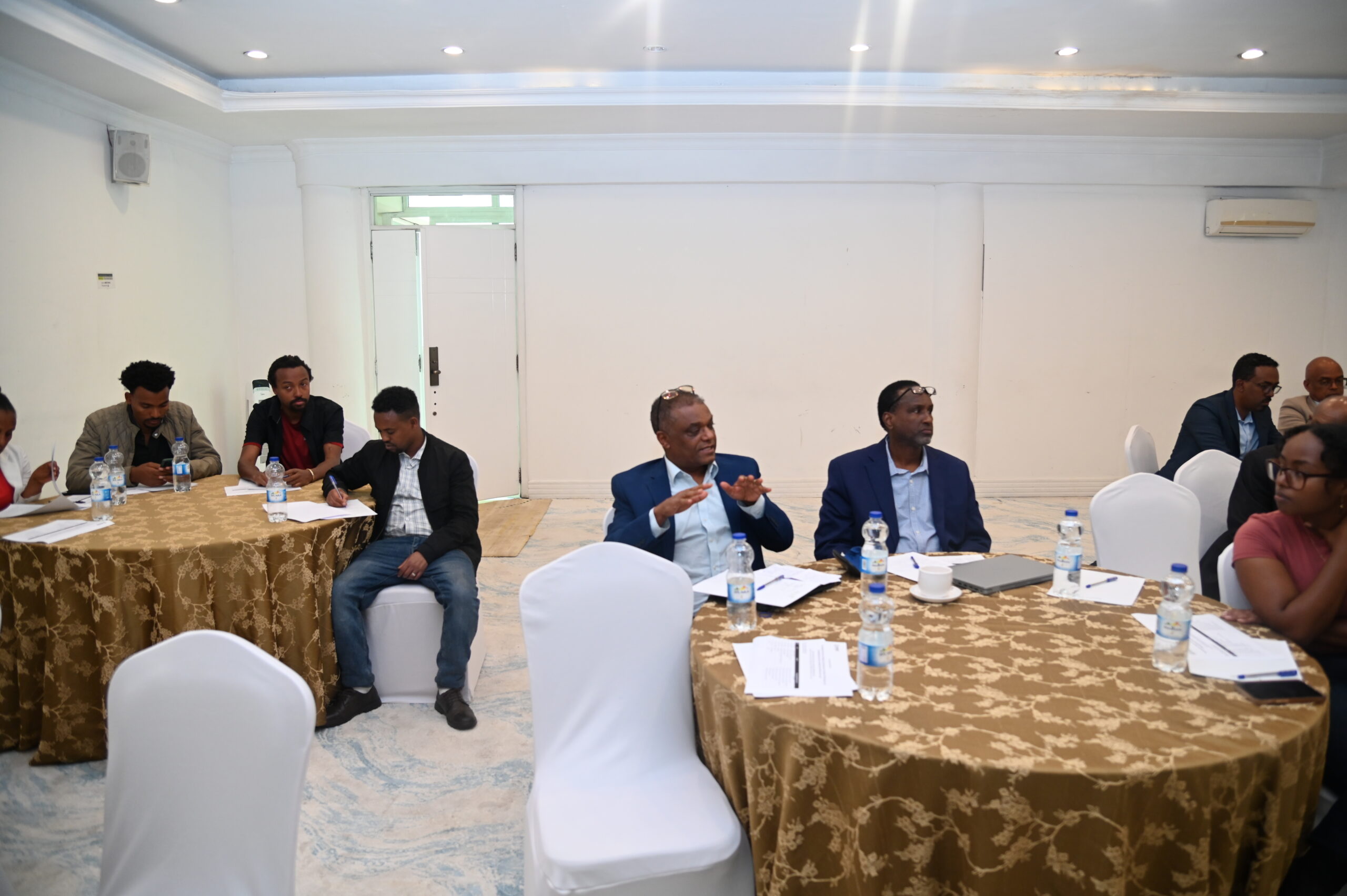
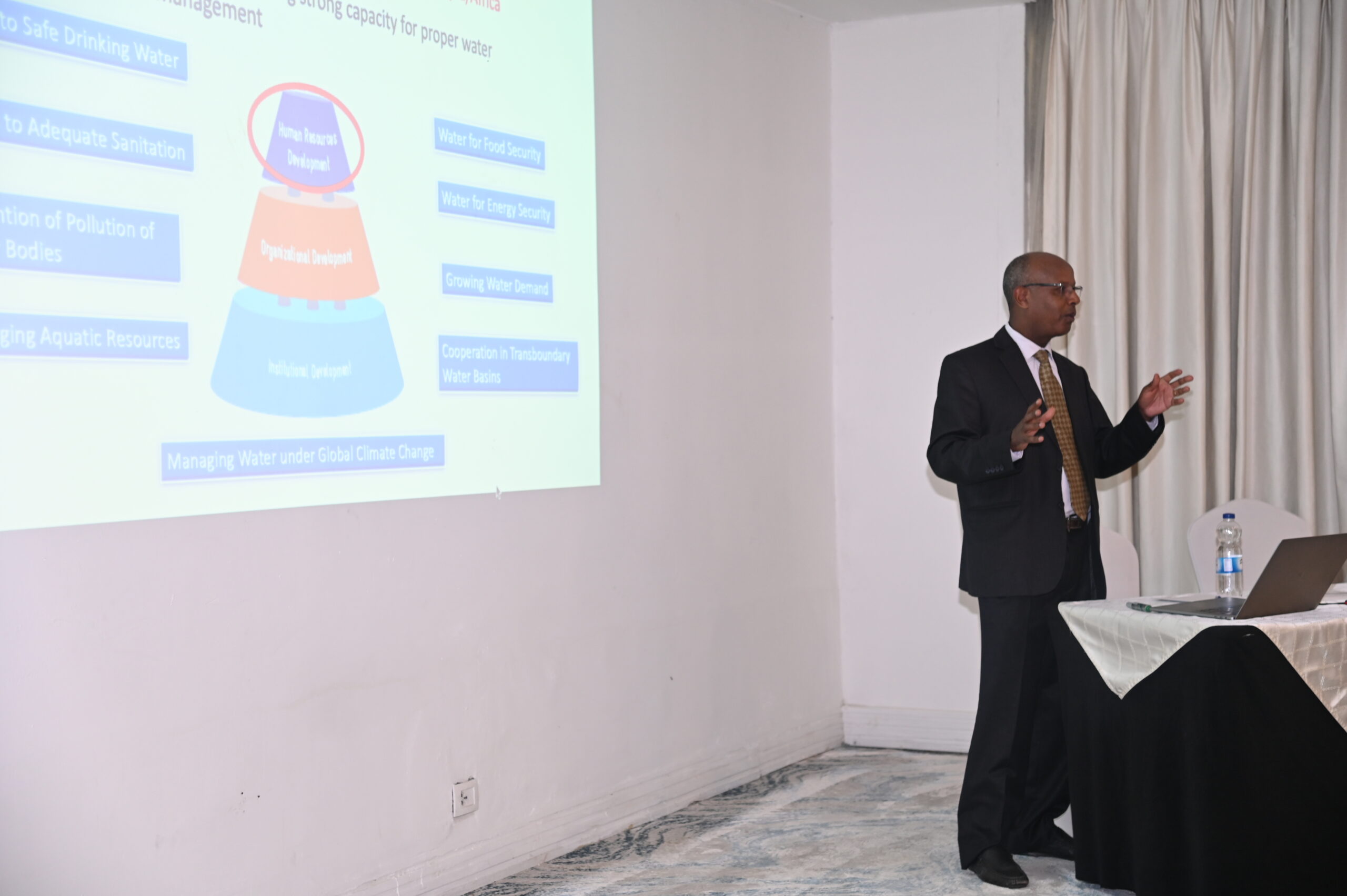
The outcomes of this consultative workshop stand to significantly impact groundwater management in the selected woredas. By fostering dialogue among experts and stakeholders, the workshop aimed to create a coordinated framework for future mapping and assessment initiatives. The insights gained will contribute to crafting strategies that not only improve water resource management but also enhance the livelihoods and resilience of local communities relying on these vital resources.
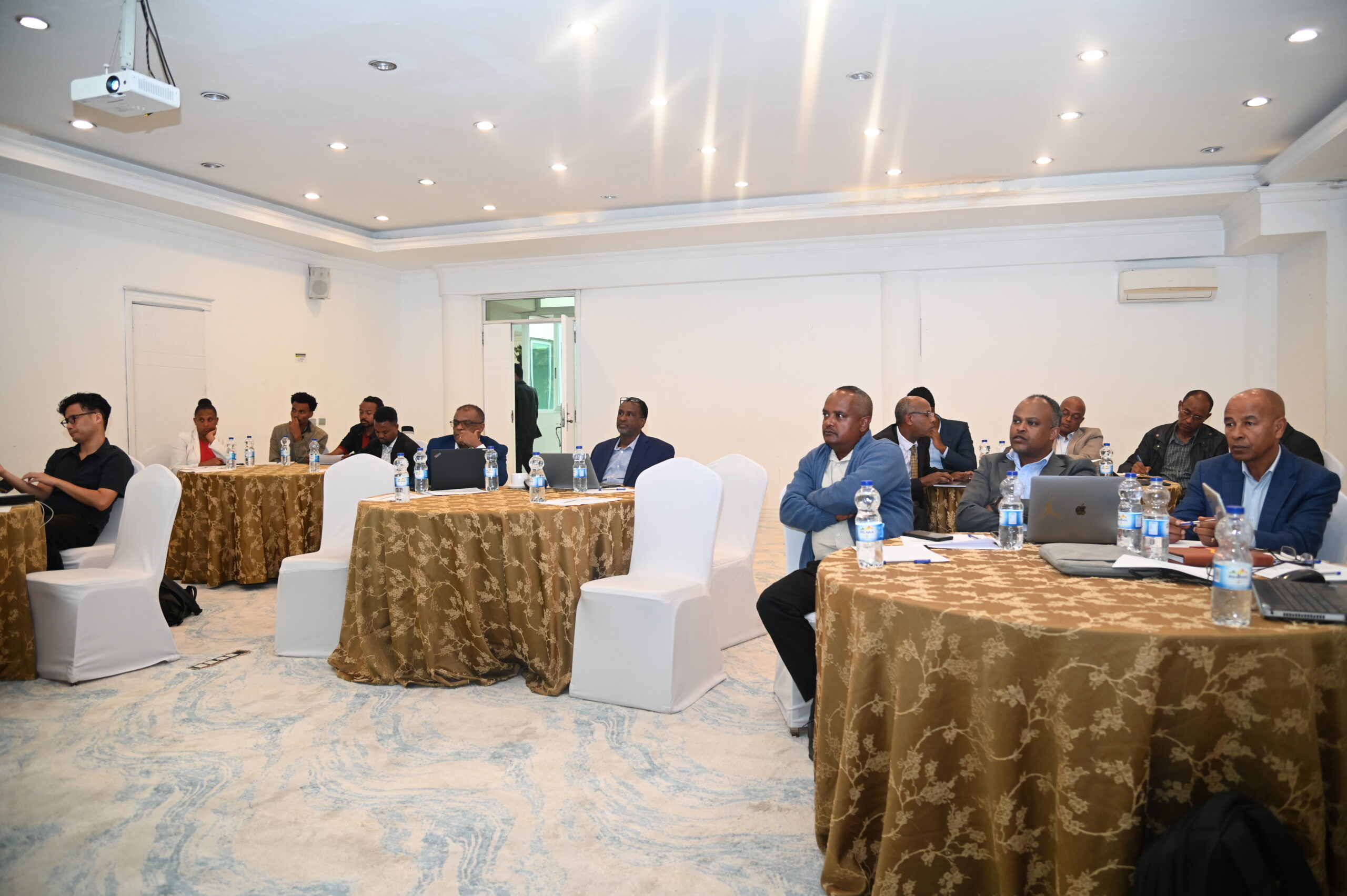

The Consultative Workshop on groundwater resources mapping and assessment represents a proactive step toward sustainable water management in the region. By working collaboratively and focusing on capacity building, stakeholders are laying the groundwork for a comprehensive approach to groundwater resource management. As challenges related to water scarcity continue to escalate, the principles and strategies discussed during the workshop will play a crucial role in ensuring equitable and sustainable access to groundwater for generations to come.
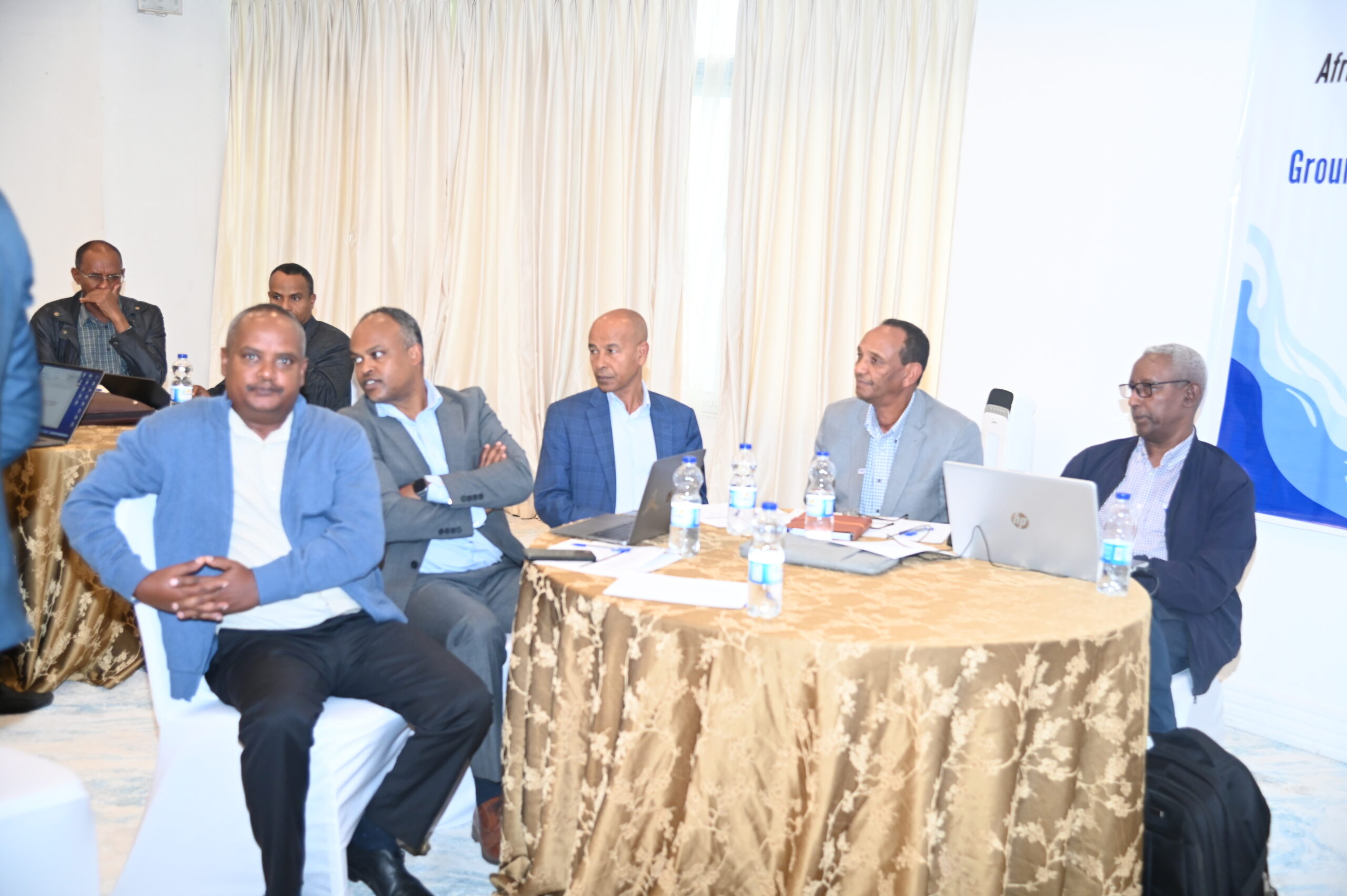
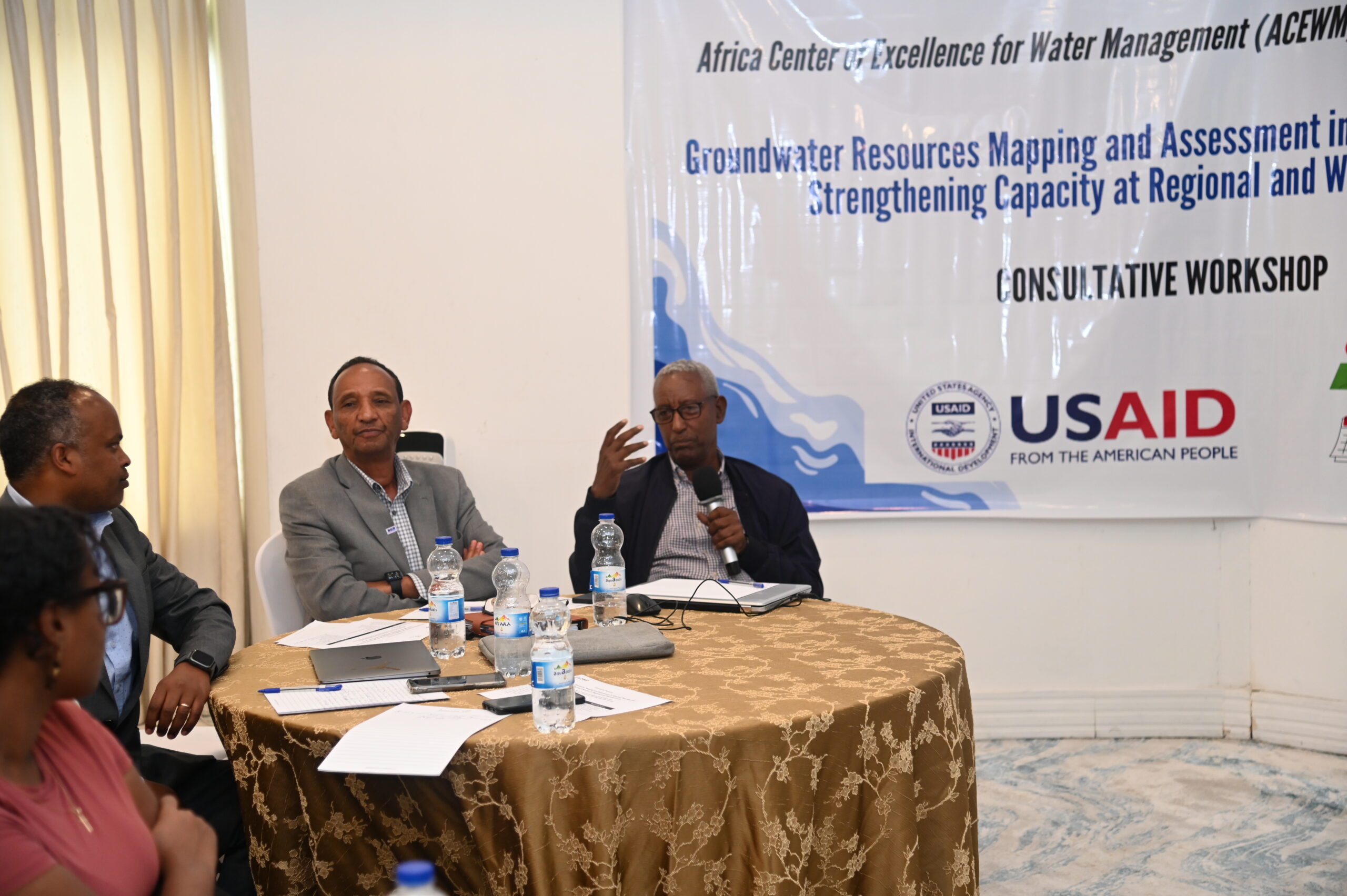
GILBERT CHIFUNDO HAS SUCCESSFULLY DEFENDED HIS PHD DISSERTATION
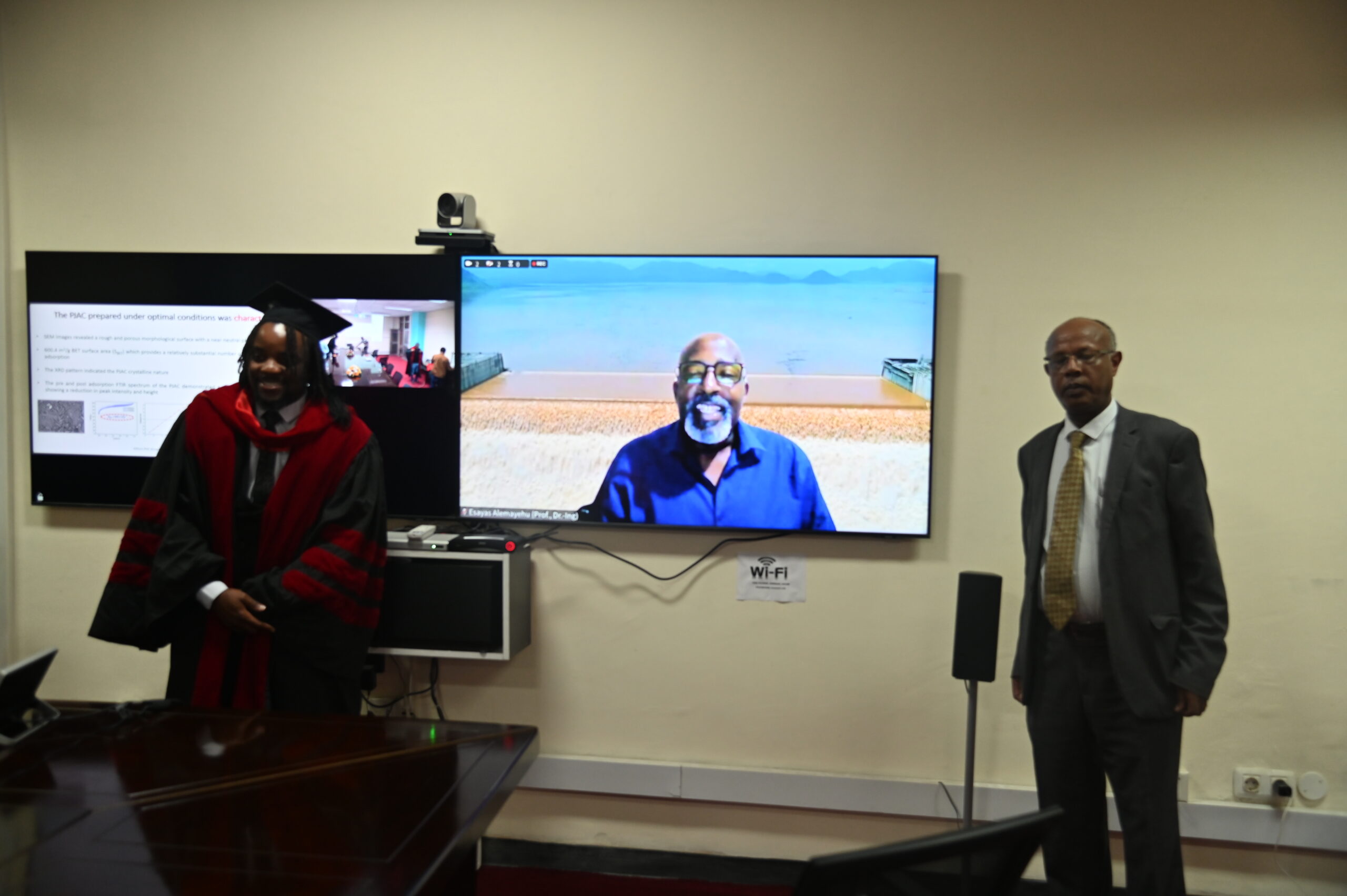
The title of his dissertation is “Heavy Metal Removal from Wastewater Utilizing an Adsorbent Immobilized on an Inclined Plate Settler”. The study aimed to developing an innovative wastewater treatment prototype integrating Inclined Plate Settlers (IPS) and Composite Adsorbent Coating (CAC) for heavy metal removal from aqueous solutions, improving its practicality for large-scale applications.
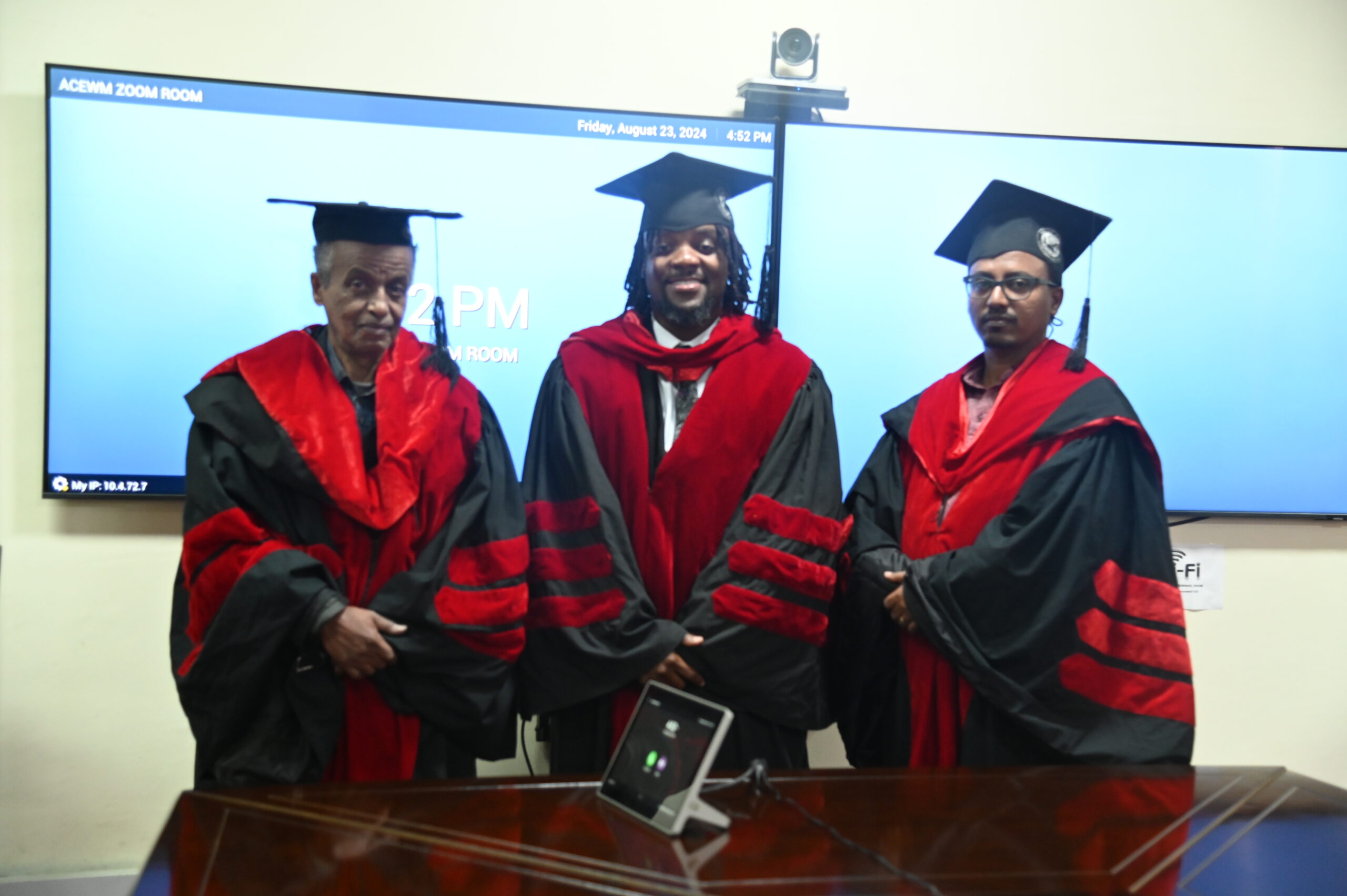
Dr Beteley Tekola chaired the defense session with Prof. Yonas Chebude from Addis Ababa University as the main supervisor and Dr Shimeles Kebede from Addis Ababa University as co-supervisor. Prof. Feleke Zewge from Addis Ababa University and Prof., Dr.-Ing Esayas Alemayehu from Jimma University served as the internal and external examiners, respectively.
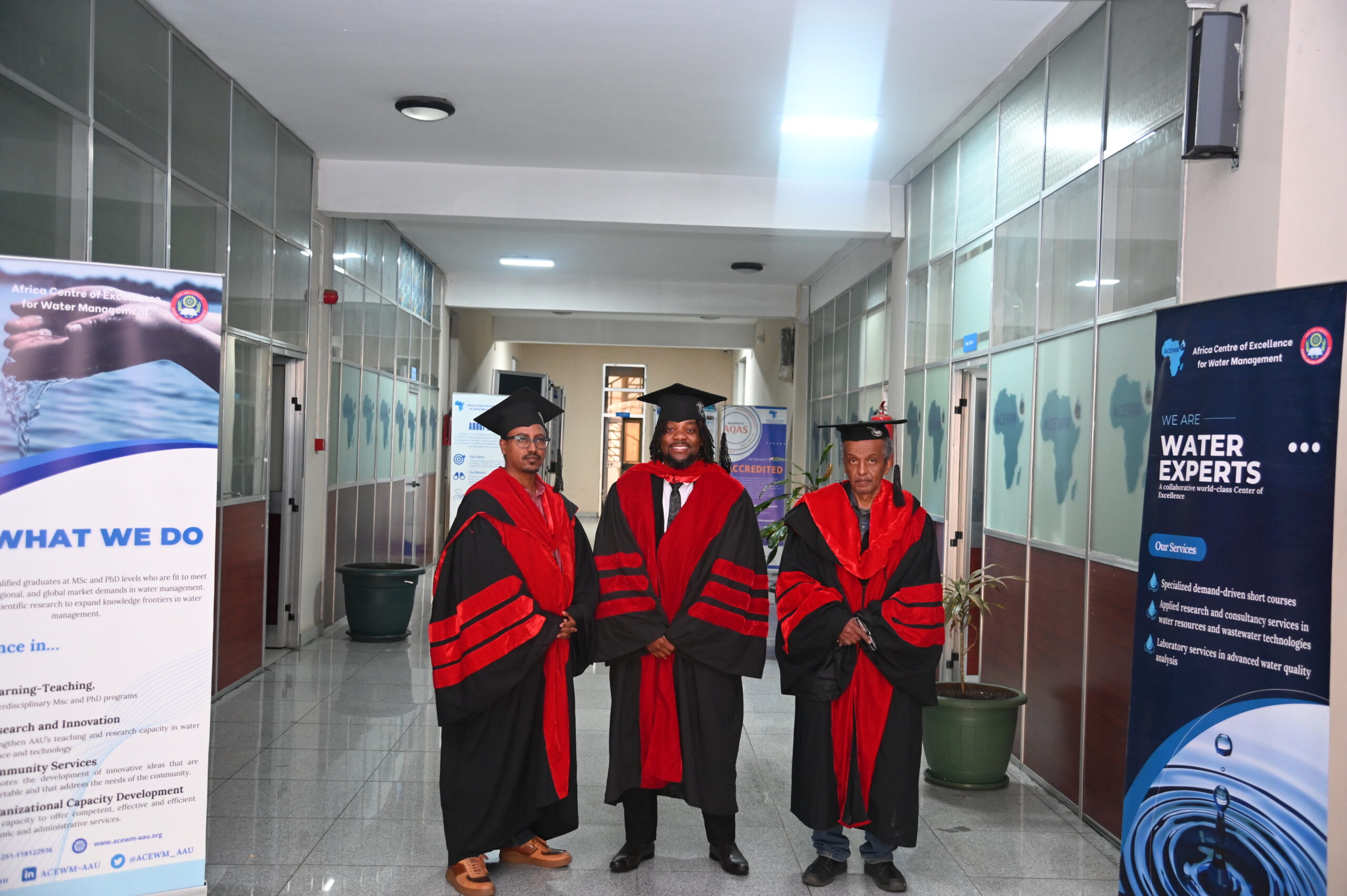
The Africa Center of Excellence for Water Management extended warm congratulations to Dr. Gilbert Chifundo and wishes him all the best in his future career.
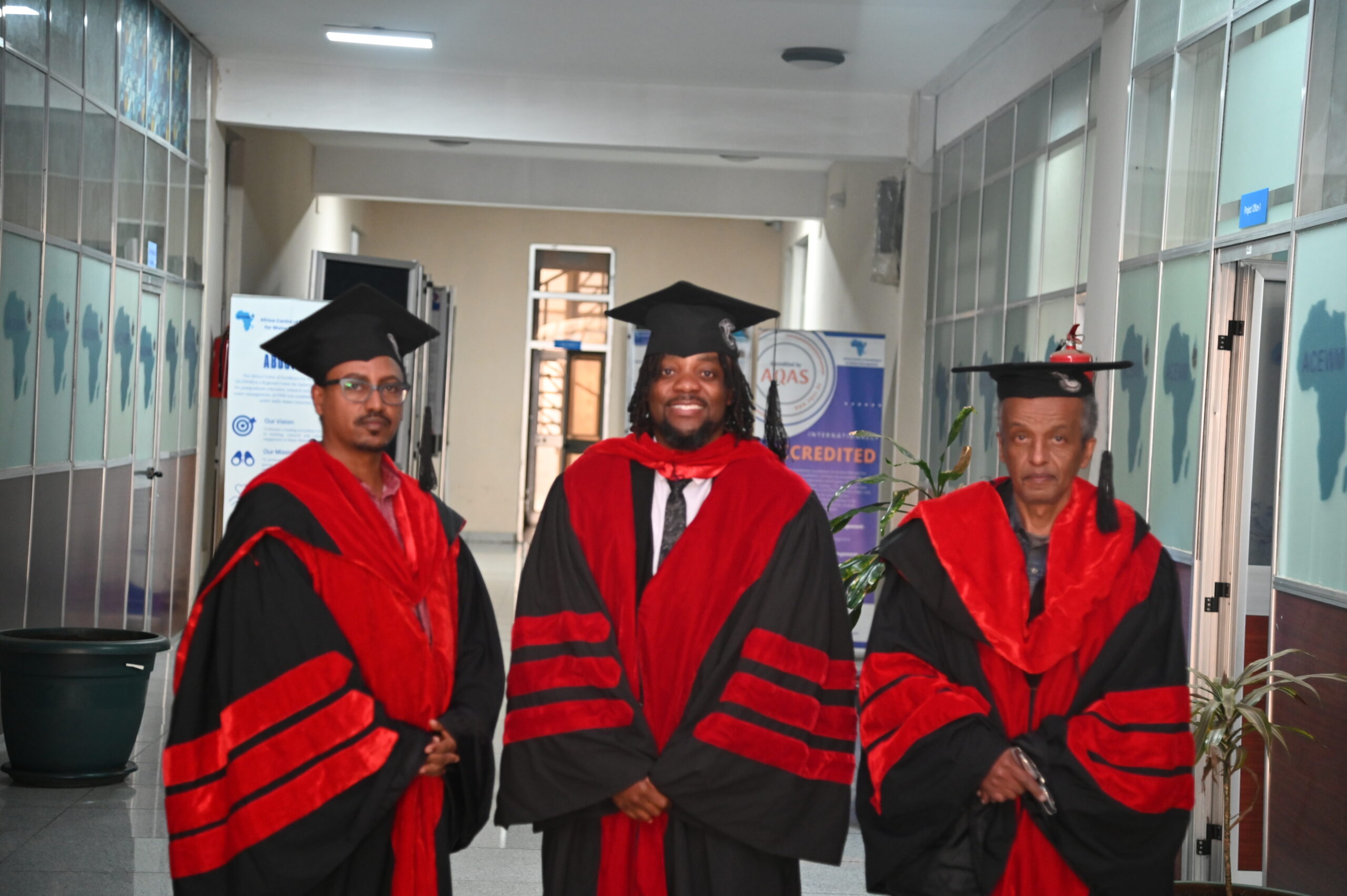
The Africa Center of Excellence for Water Management (ACEWM), internationally accredited by the German-based Agency for Quality Assurance through Accreditation of Study Programs (AQAS) which is the first of its kind in Ethiopia, is an initiative of the Government of the Federal Democratic Republic of Ethiopia and the World Bank Group and through the Eastern and Southern Africa (ESA) Regional Center hosted by the Addis Ababa University (AAU).
Since 2016, t h e ACEWM has been offering interdisciplinary MSc and PhD programs in the fields of Water Management, with the primary purpose of training the next generation of water educators, researchers, managers, and professionals and engaging in community outreach activities. Currently, the ACEWM ( ) has several PhD and MSc students from Eastern and Southern Africa and Europe. ACEWM has established partnerships with different universities nationally, region- ally and internationally to collaborate in capacity building, faculty and student exchanges, research and internships. ACEWM engages high caliber and renowned pro- fessionals in the field of water management from different disciplines.
Call for Application for Admission MSc Program in One Health for 2024/25 Academic Year in College of Veterinary Medicine and Agriculture, Addis Ababa University
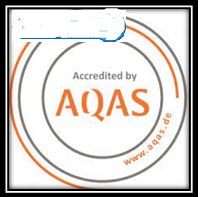
The One Health (OH) approach in managing endemic and emerging zoonotic disease outbreaks is based on the recognition of the fact that coordinated and collaborative efforts among experts in the human, animal and environment sectors optimizes the prevention and control of these diseases. It has also been adopted as the core driver to make the world safer from infectious diseases by the Global Health Security Agenda (GHSA)which is an alliance of over 60 governments and international partners. The GHSA was launched in February 2014 with the aims of advocating for a world safe and secure from infectious disease threats; bringing together nations from all over the world to make new, concrete commitments, and elevating global health security as a national leaders-level priority. This agenda is the basis on which major institutional donors such as the World Bank and USAID support various country governments to institutionalize One Health system improving disease outbreaks response.
Planetary Environmental health may affect human and animal health through contamination, pollution and changing climate conditions that may lead to emergence of new infectious agents. Worldwide, nearly 75 percent of all emerging human infectious diseases in the past three decades originated in animals. The world population is projected to grow from 7 billion in 2011 to 9 billion by 2050. To provide adequate healthcare, food and water for the growing global population, the health professions, and their related disciplines and institutions, must work together. Human-animal interactions/bonds can beneficially impact the health of both people and animals.
Ethiopia is fully committed to the One Health approach, which is supported by the National One Health platform that involves the active participation of multiple stakeholders, and indeed several policy documents recommend issues. multi-stakeholder and multi-disciplinary approaches to better address complex public health issues.
Cognizant of these facts, the Africa Center of Excellence for Water Management (ACEWM) and the College of Veterinary Medicine and Agriculture (CVMA) of AAU calls for outstanding scholars to apply for the MSc in One Health programs for the 2024/25 academic year. The program will be hosted by the CVMA and will be delivered in collaboration with the ACEWM, CVMA, College of Health Science , Aklilu Lemma Institute of Pathobiology, Addis Ababa Institute of Technology, and Ethiopian Construction. Institute of Architecture and Building construction.
|
Programs |
Specialization |
Academic Requirements |
|
MSc |
One Health |
Bachelor Degree in any of health, environment and veterinary medicine disciplines as well as relevant disciplines in natural sciences and engineering. |
Duration of the ProgramsThe MSc program will have a duration of 2 years.
Mode of Delivery:The program is delivered on full-time basis, and the teaching methodology will be through lectures, seminars, field-based studies, video conferences and technology-enhanced learning approaches. The medium of instruction throughout the study is English.
Eligibility Criteria for MSc:
- MSc. applicants must have a Bachelor’s Degree earned from a recognized university with a Cumulative GPA is not less than 2.75 for males and not less than 2.50 for females on a 4.0 scale.
- Applicants are required to take and pass the entrance examination (written and/or oral) that will be administered by the academic unit
- The age limit at the time of application for M.Sc. applicants is 35 years or less
General Eligibility Criteria
- Applicants who have completed their degree/diploma from foreign universities are required to obtain their degree/diploma equivalent from the FDRE Education and Training Authority (ETA) before admission. (Academic documents authentication by the relevant office is mandatory for admission).
- Applicants must have sufficient knowledge of the English language and provide proof of proficiency.
- Applicants are required to take and pass entrance examination (written and oral), and the Graduate Admission Test (GAT) (For details, please check on Telegram: t.me/aauGAT)
- Applicants need to meet also the general requirements laid down by Addis Ababa University
Application Requirements and Procedures (Submit all documents compiled in one pdf file)
- A cover page containing the applicant’s full name as it appears on the applicant’s ID/Passport, full contact details including
residential and postal address, email and telephone number (s), and intended field of study - A copy of the identification card/Passport of the applicant,
- Detailed curriculum vitae not exceeding 4 pages,
- Authenticated copies of previous degrees and official transcripts from previous university/college,
- Applicants should be willing to undertake their full-time research in Ethiopia
- A personal statement/motivation letter describing the candidate’s interest to join the program not exceeding 500 words,
- Three letters of recommendation from instructors/supervisors from previous educational institutions, organizations,
- Applicants sponsored by their institutions are required to submit a sponsorship letter from their institution (The form can be downloaded from http //www.aau.edu.et/documents/registrar/
- Employed applicants must provide a letter of full commitment from their employers that they will be granted study leave.
- Cost-Sharing clearance documents for Ethiopian applicants are required.
- Certificate of professional experience if any is a plus
Fellowship
The Urban-Suburban Nexus towards One Health Approach Project funded by NORAD through the NORHEDII Program and coordinated by the ACEWM, will provide limited stipend support and financial support for MSc. Research work for a maximum of 10 successful applicants on competitive basis.
*** Female applicants are highly encouraged to apply.
How to Apply
Only shortlisted applicants will be contacted through their emails. |
Call for Application for Admission MSc and PhD programs (Regular) in 2024/25 Academic Year for Applicants from Ethiopia

The Africa Center of Excellence for Water Management (ACEWM), internationally accredited by the German-based Agency for Quality Assurance through Accreditation of Study Programs (AQAS) which is the first of its kind in Ethiopia, is an initiative of the Government of the Federal Democratic Republic of Ethiopia and the World Bank Group and through the Eastern and Southern Africa (ESA) Regional Center hosted by the Addis Ababa University (AAU).
Since 2016, t h e ACEWM has been offering interdisciplinary MSc and PhD programs in the fields of Water Management, with the primary purpose of training the next generation of water educators, researchers, managers, and professionals and engaging in community outreach activities. Currently, the ACEWM (www.acewm-aau.org) has several PhD and MSc students from Eastern and Southern Africa and Europe. ACEWM has established partnerships with different universities nationally, region- ally and internationally to collaborate in capacity building, faculty and student exchanges, research and internships. ACEWM engages high caliber and renowned pro- fessionals in the field of water management from different disciplines.
For the 2024/25 academic year, ACEWM calls for outstanding scholars to apply for its PhD and MSc programs (regular) in the following specializations.
|
Programs |
Tracks |
Academic Requirements |
|
PhD |
Water Science and Technology |
MSc degree in environmental engineering, water resources engineering, water supply engineering, water supply and sanitation, wastewater engineering, water quality management, environmental chemistry, chemical engineering, chemistry or other related fields from a recognized university. |
|
Aquatic Ecosystems Management |
MSc degree in aquatic science, aquatic ecosystems, environmental science, limnology or other related areas from a recognized university. |
|
|
Hydrology & Water Resources Management |
MSc in hydrology, hydrogeology, water supply, water resources engineering, water resources management or other related areas from a recognized university |
|
|
MSc |
Water Quality Management |
BSc. degree in chemistry, biology, geology, chemical engineering, environmental science or environmental engineering from a recognized university. |
|
Water Supply and Sanitation |
BSc. degree in civil engineering, environmental engineering, water resources engineering, or water supply engineering or other related areas of engineering from a recognized university. |
|
|
Aquatic Ecosystems Management |
BSc. degree in fisheries, biology, animal sciences or other related areas from a recognized university. |
|
|
Water and Wastewater Technologies |
BSc. degree in civil engineering, environmental engineering, water resources engineering, chemical engineering, chemistry or other related areas of engineering from a recognized university. |
|
|
Hydrology and Water Resources |
BSc. degree in water resources, hydrogeology, geography, civil engineering, hydraulic engineering or environmental engineering from a recognized university. |
Duration of the Programs
- The PhD program will have a duration of 4 years and the MSc program will have a duration of 2 years.
Mode of Delivery
- The programs are a full-time study and teaching takes place through lectures, seminars, and field-based studies. In addition, teaching may be conducted through video conferences and technology-enhanced learning approaches. The language of instruction throughout the study is English.
Eligibility Criteria
- Applicants to the Ph.D. program should provide evidence of capacity for research. This includes a master’s thesis published paper in a reputable journal or other appropriate evidence of capacity to conduct high-quality research.
- Applicants who have completed their degree/diploma from foreign universities are required to obtain their degree/diploma from the FDRE Education and Training Authority (ETA) before admission (Academic documents authentication by the relevant office is mandatory during admission).
- Applicants must have sufficient knowledge of the English language and provide proof of proficiency.
- Applicants are required to take and pass the Graduate Admission Test (GAT) (For details, please check on Telegram:t.me/aauGAT)
- Applicants need to meet also the general requirements laid down by AAU Graduate Programmes, Addis Ababa University
Application Requirements and Procedures (Submit all documents compiled in one pdf file)
- A cover page containing the applicant’s full name as it appears on the applicant’s ID/Passport, full contact details including residential and postal address, email and telephone number (s), and intended field of study
- A copy of the identification card/Passport of the applicant,
- Detailed curriculum vitae not exceeding 4 pages,
- Authenticated copies of previous degrees and official transcripts from previous university/college,
- Applicants for PhD programs should identify at least one PhD supervisor from AAU/Partner institute and
include CV of the potential supervisor and consent to supervise the applicant’s research work during the
study period. - Applicants for PhD programs should be willing to undertake their full-time research in Ethiopia
- personal statement/motivation letter describing the candidate’s interest to join the program not exceeding
500 words, - Applicants sponsored by their institutions are required to submit a sponsorship letter from their
institution. (The form can be downloaded from http://www.aau.edu.et/documents/registrar/ - Employed applicants must provide a letter of full commitment from their employers that they will be granted study
leave. - Three letters of recommendation from instructors/supervisors from previous educational institution, organizations,
- Certificate of professional experience if there is any,
- Cost-Sharing clearance documents for Ethiopian applicants.
Fellowship
- ACEWM will have a modest funding to support MSc and PhD research projects of all successful applicants.
*** Female applicants are highly encouraged to apply.
How to Apply
Only shortlisted applicants will be contacted through their emails. |
TSEGAMLAK DIRIBA HAS SUCCESSFULLY DEFENDED HIS PhD DISSERTATION
The title of his dissertation is “Groundwater Recharge Input Uncertainty Assessment in the Tikur Wuha River Catchment, Rift Valley Lakes Basin, Ethiopia”.
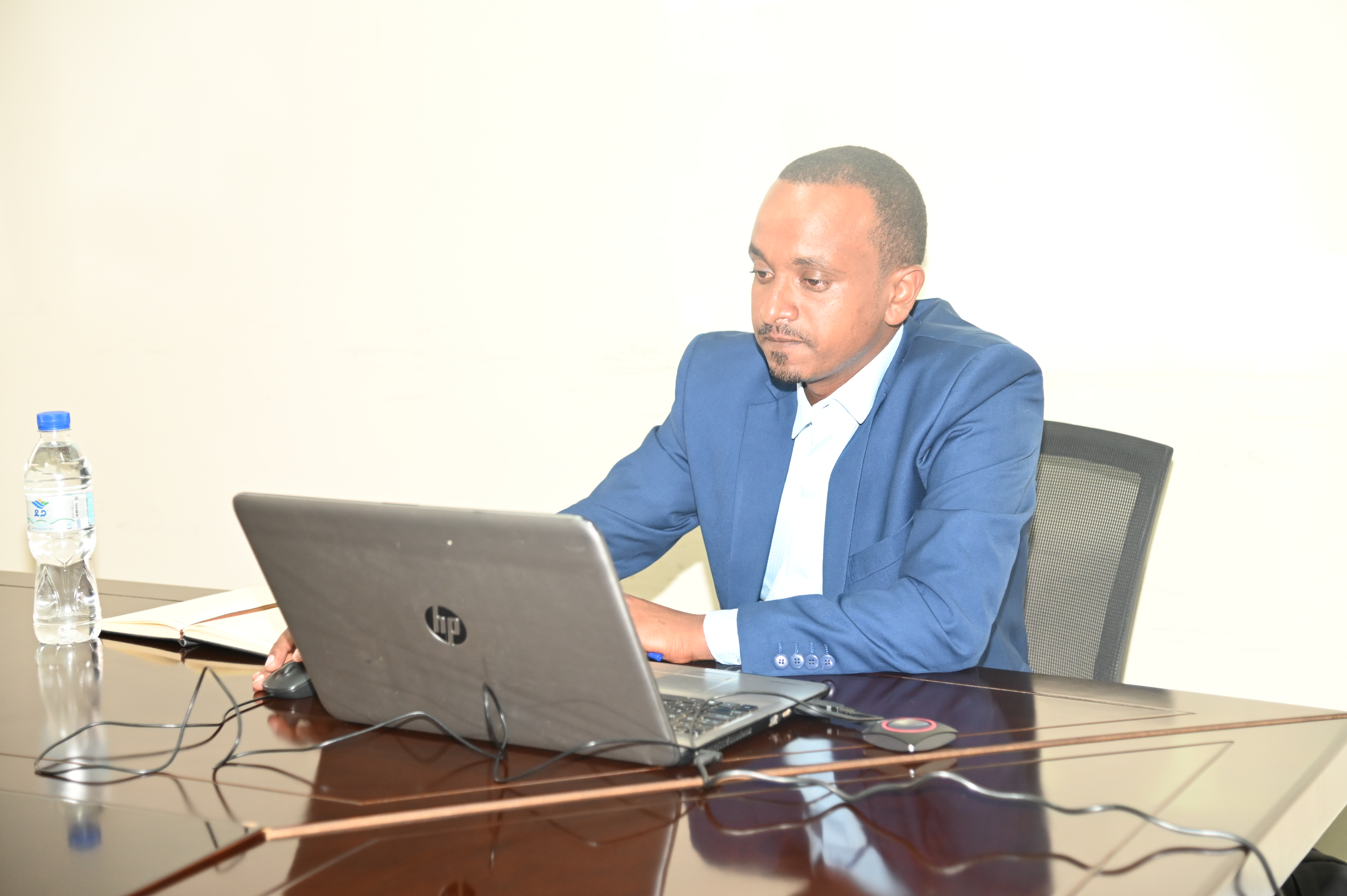
Dr. Tsegamlak has said despite the availability of groundwater recharge estimation methods, result acquired is still variable and uncertain. His study focus on investigating groundwater recharge estimation uncertainty caused due to input rainfall and evapotranspiration data in the Tikur Wuha watershed. WetSpa was used to simulate 30,000 possible combinations of parameters for three model setups; where required parameter combinations were generated using Monte Carlo simulation stratified by applying Latin Hypercube Sampling. One hundred best performing parameter combinations were selected for each model setup to generate spatial recharge statistics and assess the resulting uncertainty.
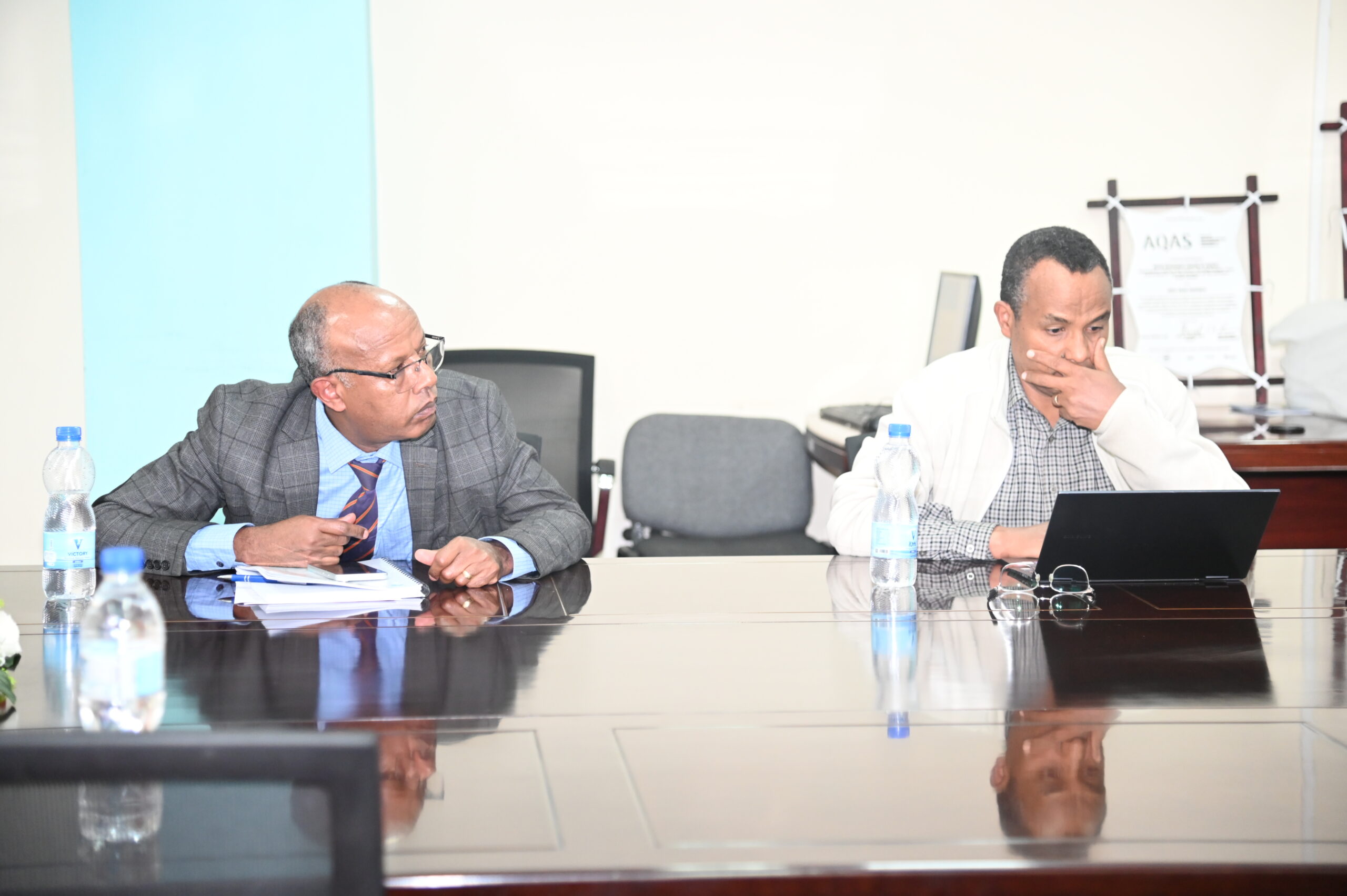
Dr. Tsegamlak stated PVE improvement up to 70% (wet) and 50% (dry) of rainfall was achieved through merging technique. Additionally, the use of improved CHIRP-based merged rainfall has reduced the recharge uncertainty. Furthermore, replacement of evapotranspiration estimates with GLEAM data set has reduced the Cv value by 54%. Future studies are recommended to consider contribution of irrigation, for the analysis of recharge uncertainty.
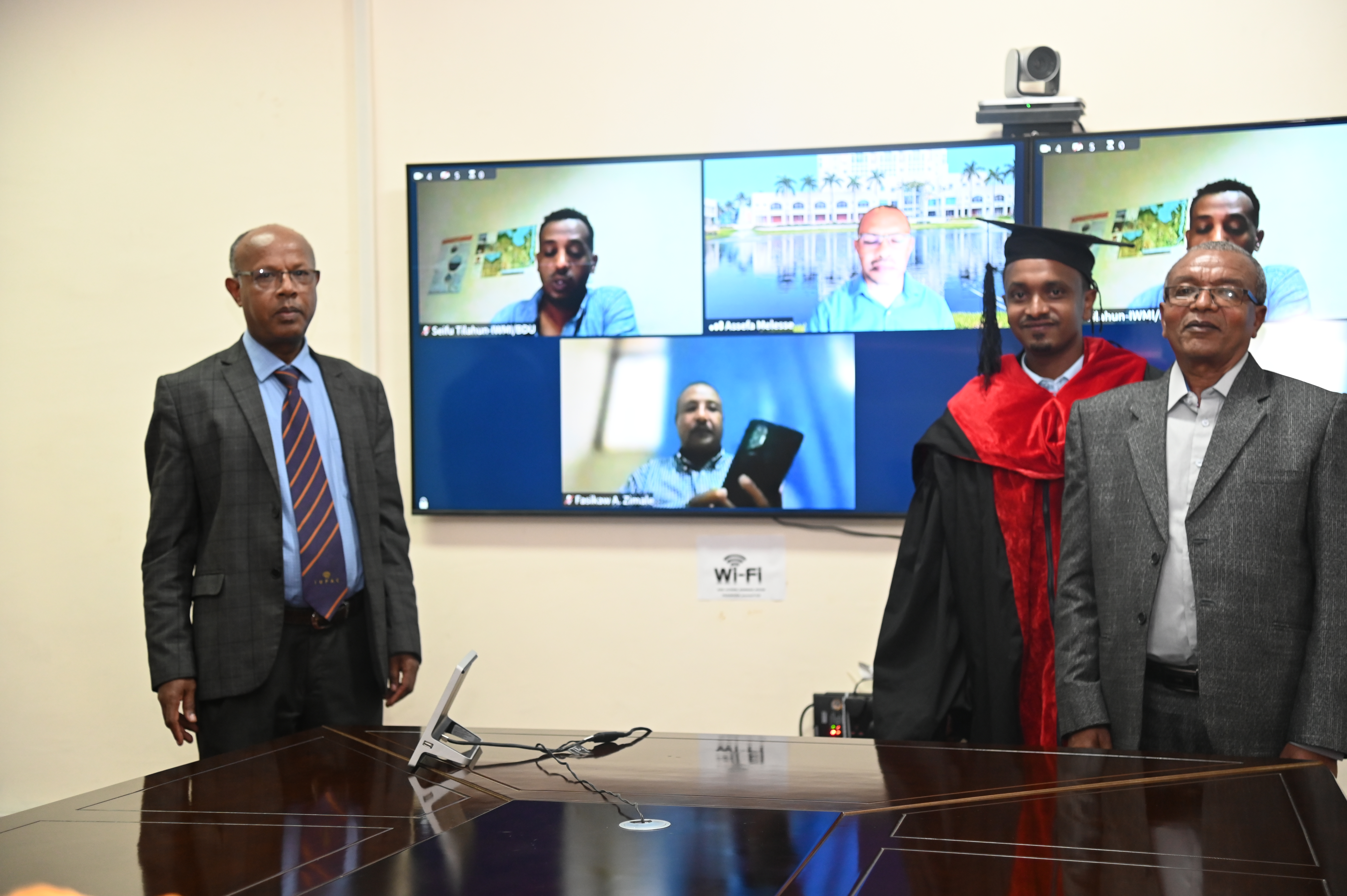
Prof. Feleke Zewge,was the chairperson of the defense session of this dissertation. The dissertation was mainly supervised by Dr. Fasikaw Atanaw from Bahir Dar University and co-supervised by two experts namely Dr. Dessie Nedaw and Dr. Sirak Tekleab both from Addis Ababa University. Prof. Seifu Admassu from Bahir Dar University and Prof. Assefa M. Melesse, from Florida International University, Miami, Florida, USA were internal and external examiners respectively.
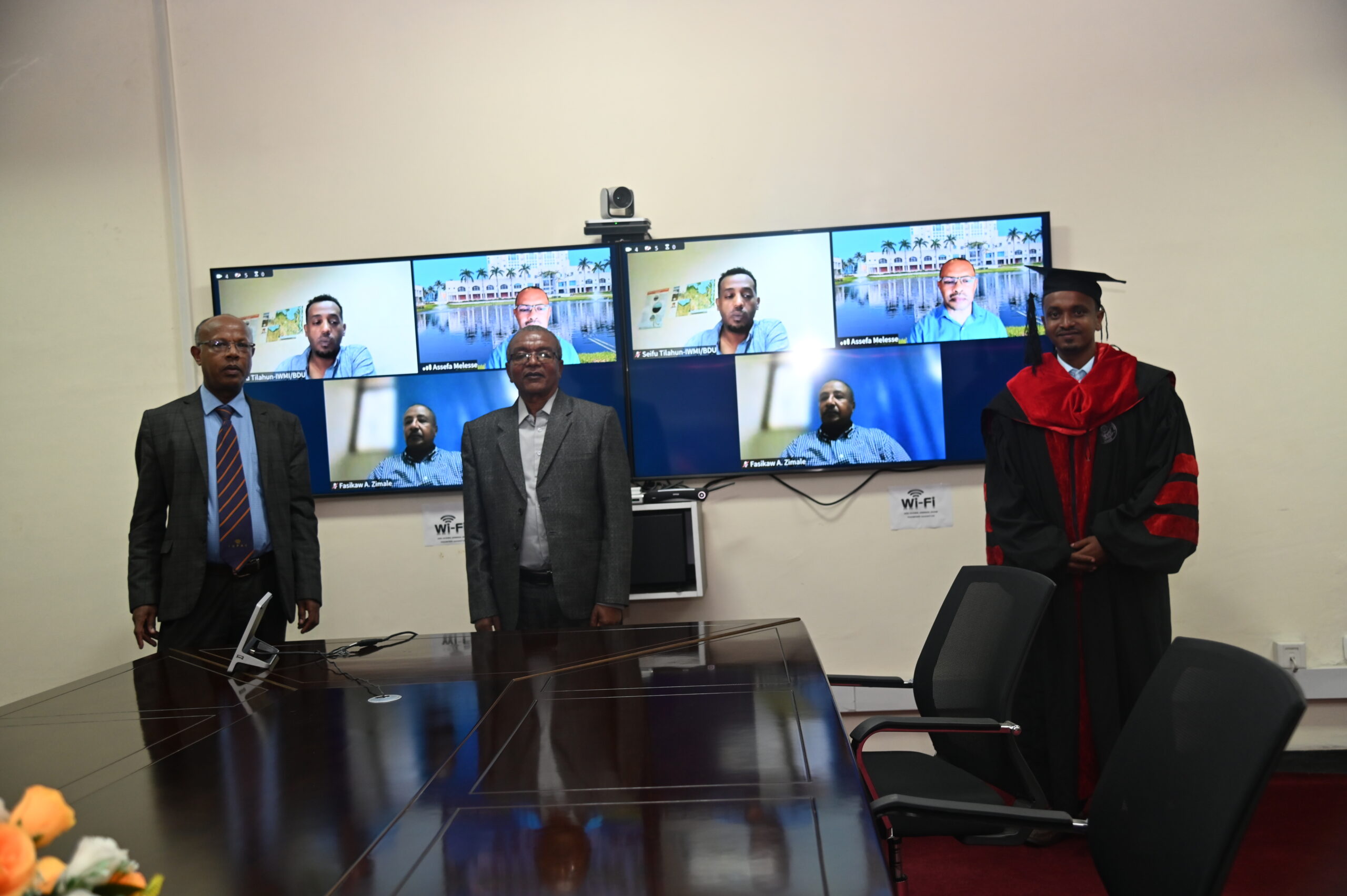
WONDIMU KEBEDE HAS SUCCESSFULLY DEFENDED HIS PHD DISSERTATION
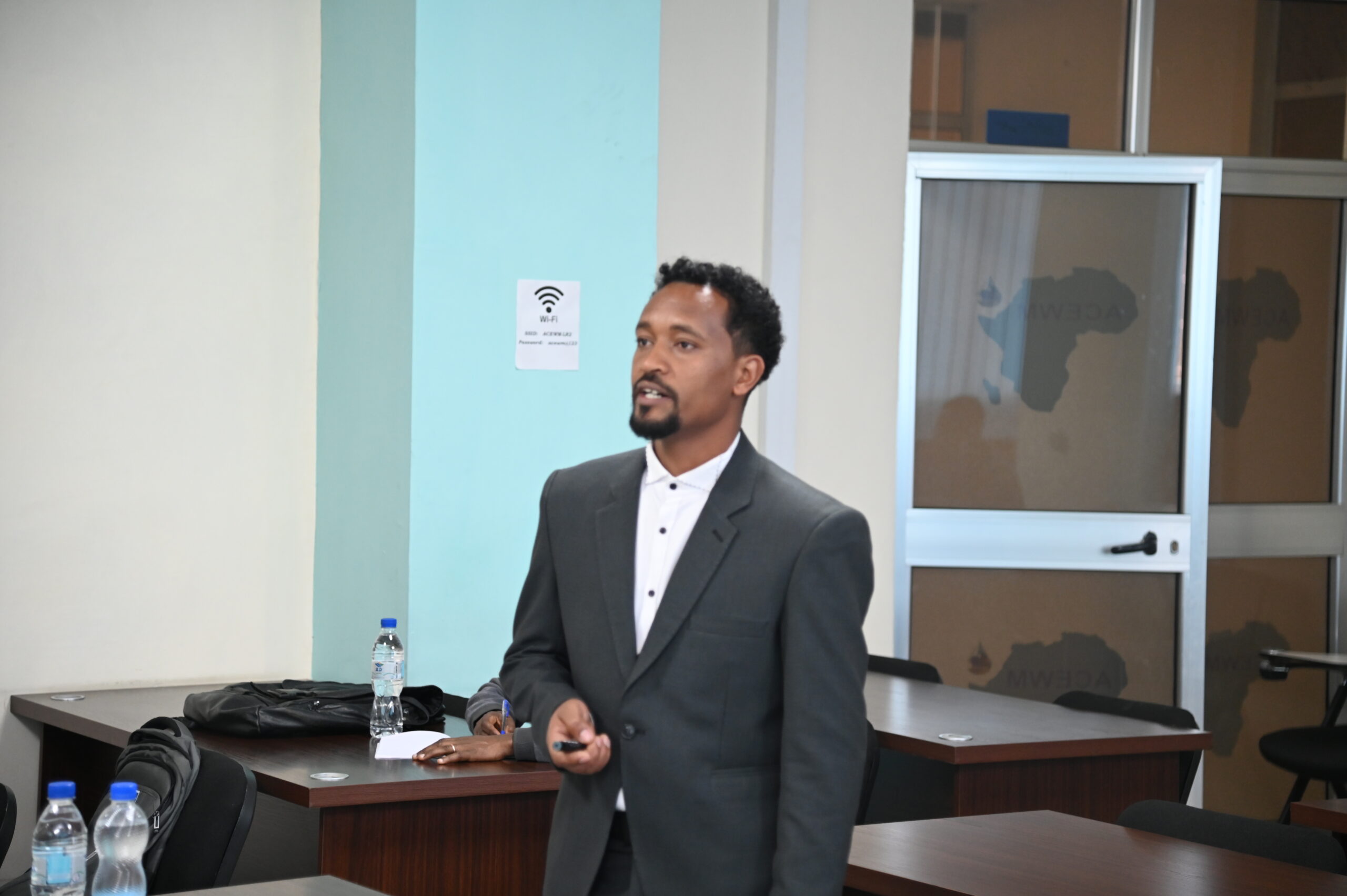
The title of his dissertation is “Enhanced removal of pharmaceutical contaminants from water using electrochemical oxidation coupled with adsorption process”.
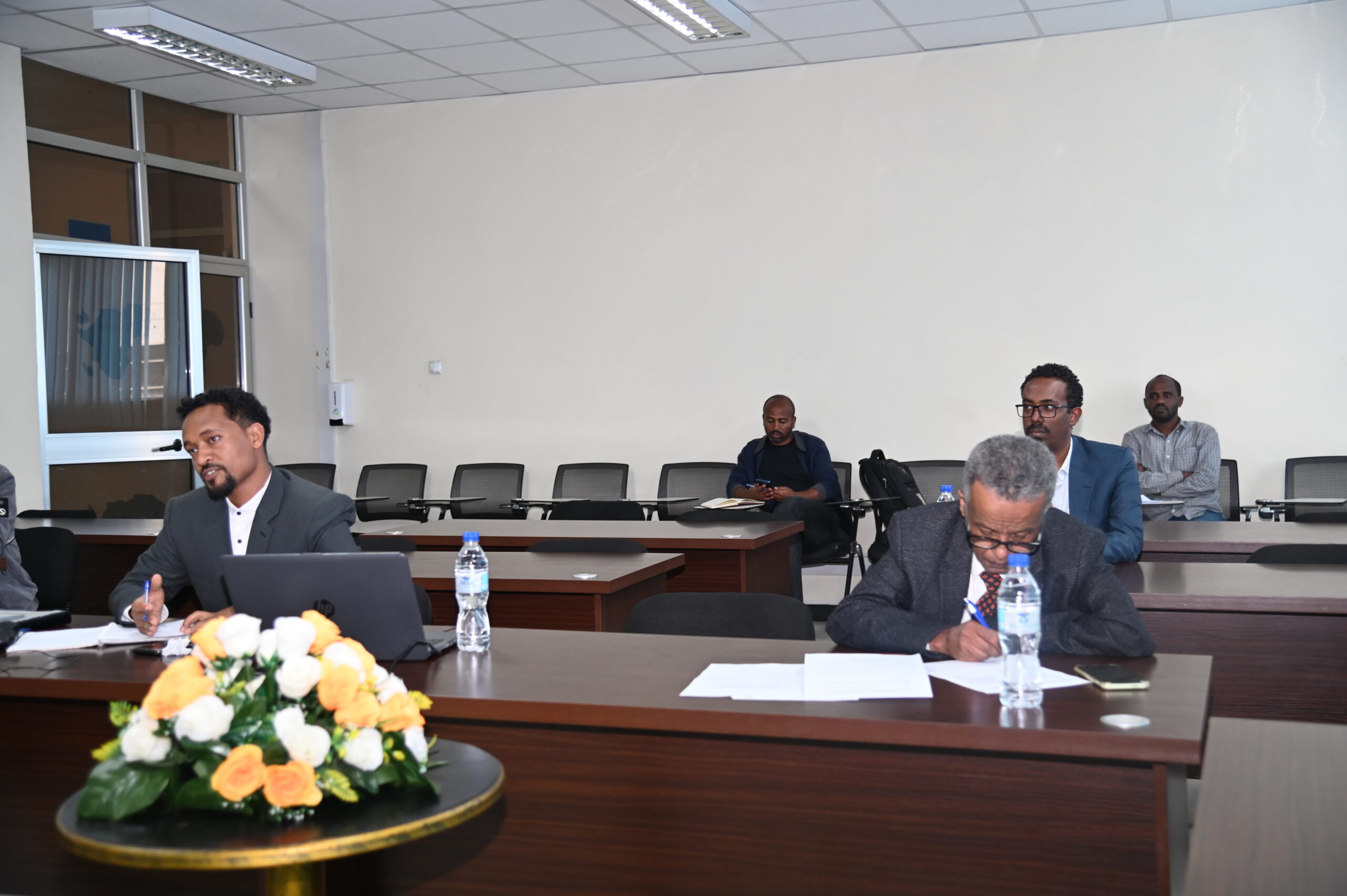
Dr. Wondimu stated Water contamination with pharmaceuticals is an emerging environmental challenge. Due to high consumption and uncontrolled release, acetaminophen (ACM), ciprofloxacin (CIP), amoxicillin (AMX), and atenolol (ATN) are frequently found in water resources, requiring technologicalintervention.
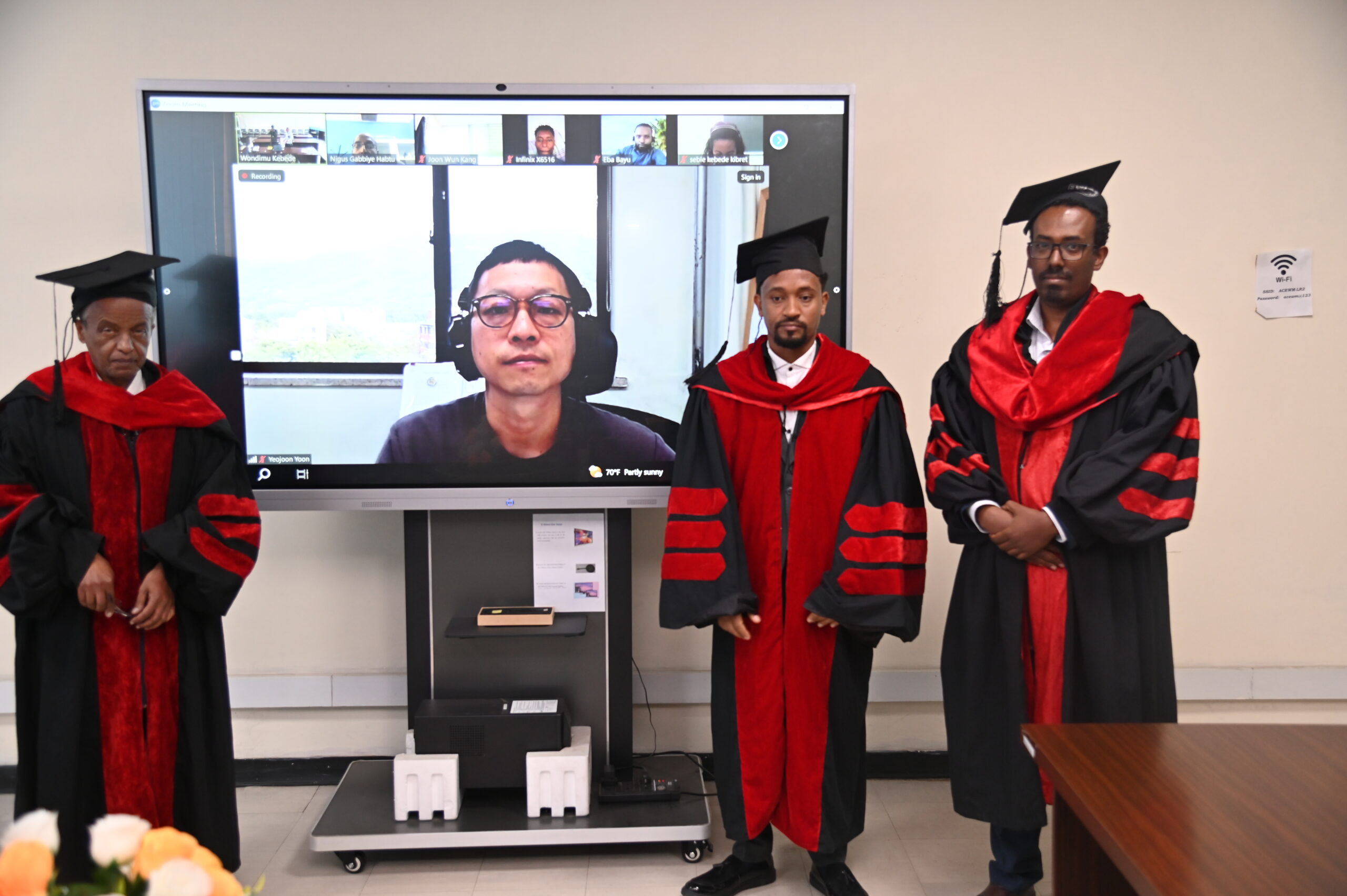
His study investigates electrochemical oxidation (EO), adsorption (employing bamboo sawdust-derived adsorbent), and coupled process (EO+adsorption) for removing these pharmaceuticals from water. Dr. Wondimu’s findings indicate that EO and adsorption are efficient in removing single/binary pharmaceuticals (ACM/CIP) from a simple water matrix but exhibit reduced efficiency in complex matrices. Moreover, EO and adsorption show limited efficiency in multiple pharmaceuticals (ACM+CIP+AMX+ATN) removal from water. Dr. Wondimu said these noted limitations are addressed through coupling EO with adsorption. The benefit of coupling EO with adsorption becomes increasingly pronounced when transitioning from singleto multiple pharmaceuticalsremoval and with increasing matrix complexity. The study concludes that the coupled process shows a notable synergy in removing pharmaceuticals, especially in scenarios involving diverse pharmaceuticals and complex water matrices.
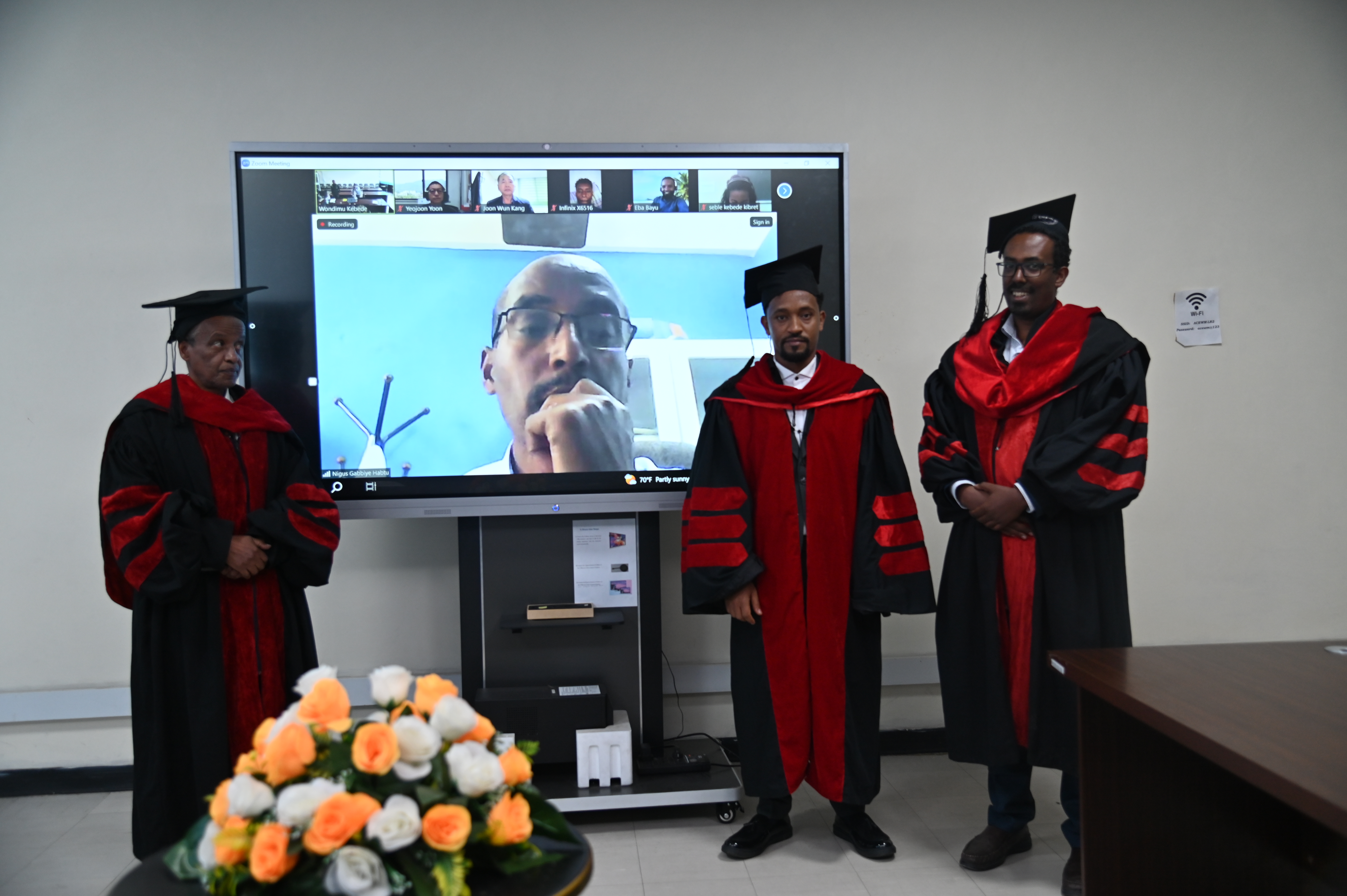
Prof. Yonas Chebude,was the chairperson of the defense session of this dissertation.The dissertation was mainly supervised by Prof. Joon Wun Kang from Yonsei University Mirae Campus; Gangwon-do, South Korea where as Dr. Beteley Tekola from Ababa University was Co-supervisor. Prof. Nigus Gabbiye from Bahir Dar University and Dr. Yeojoon Yoon from Yonsei University Mirae Campus, Gangwon-do, South Korea were internal and external examiners respectively.
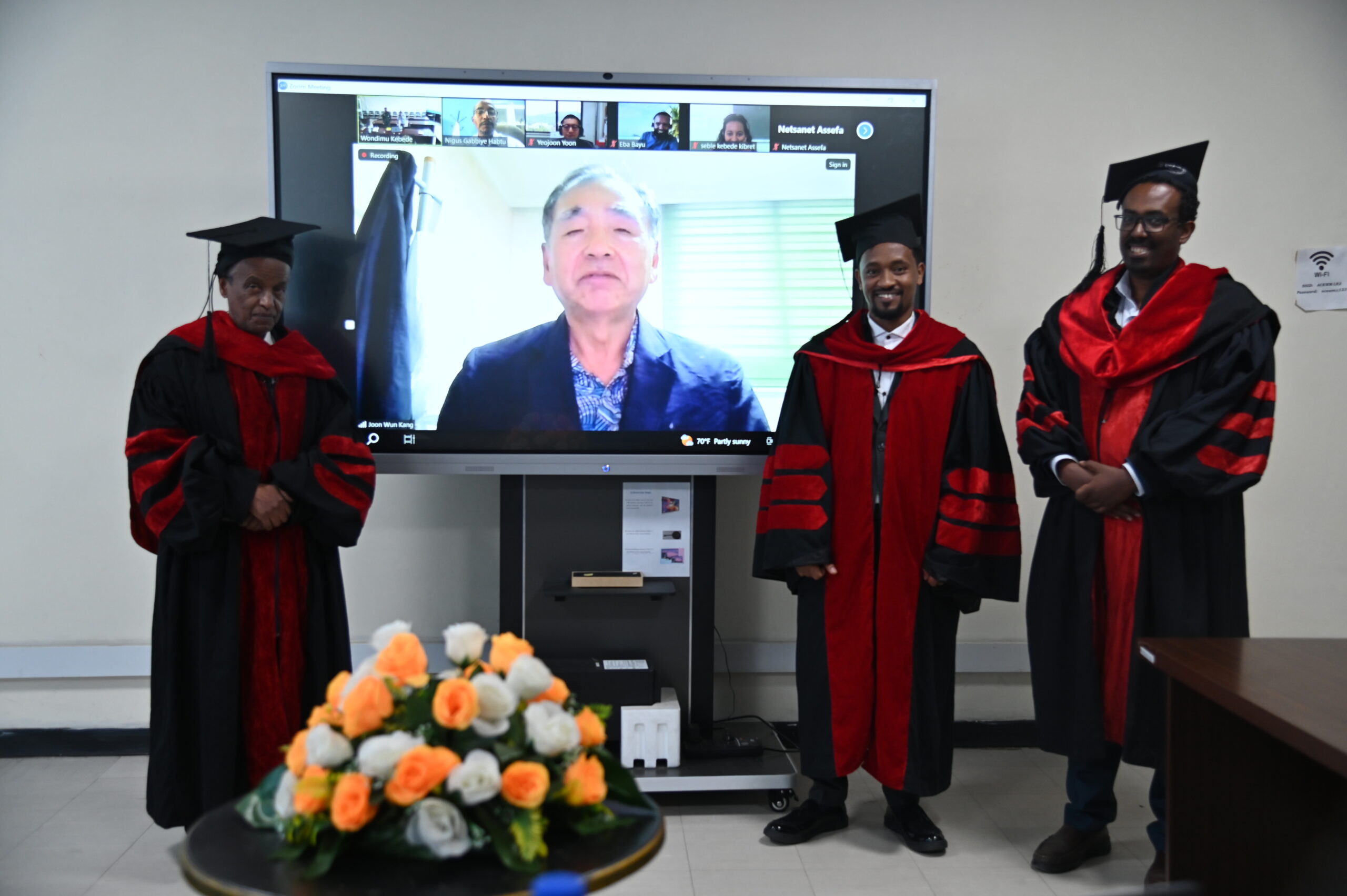
THANDILE TANZILE HAS SUCCESSFULLY DEFENDED HER PHD DISSERTATION
The topic of Dr. Thandile’s dissertation is Sustainable Management of Water Resources for Addis Ababa City, Ethiopia, in the Face of Infrastructure Expansion, Population Growth and Climate Change.
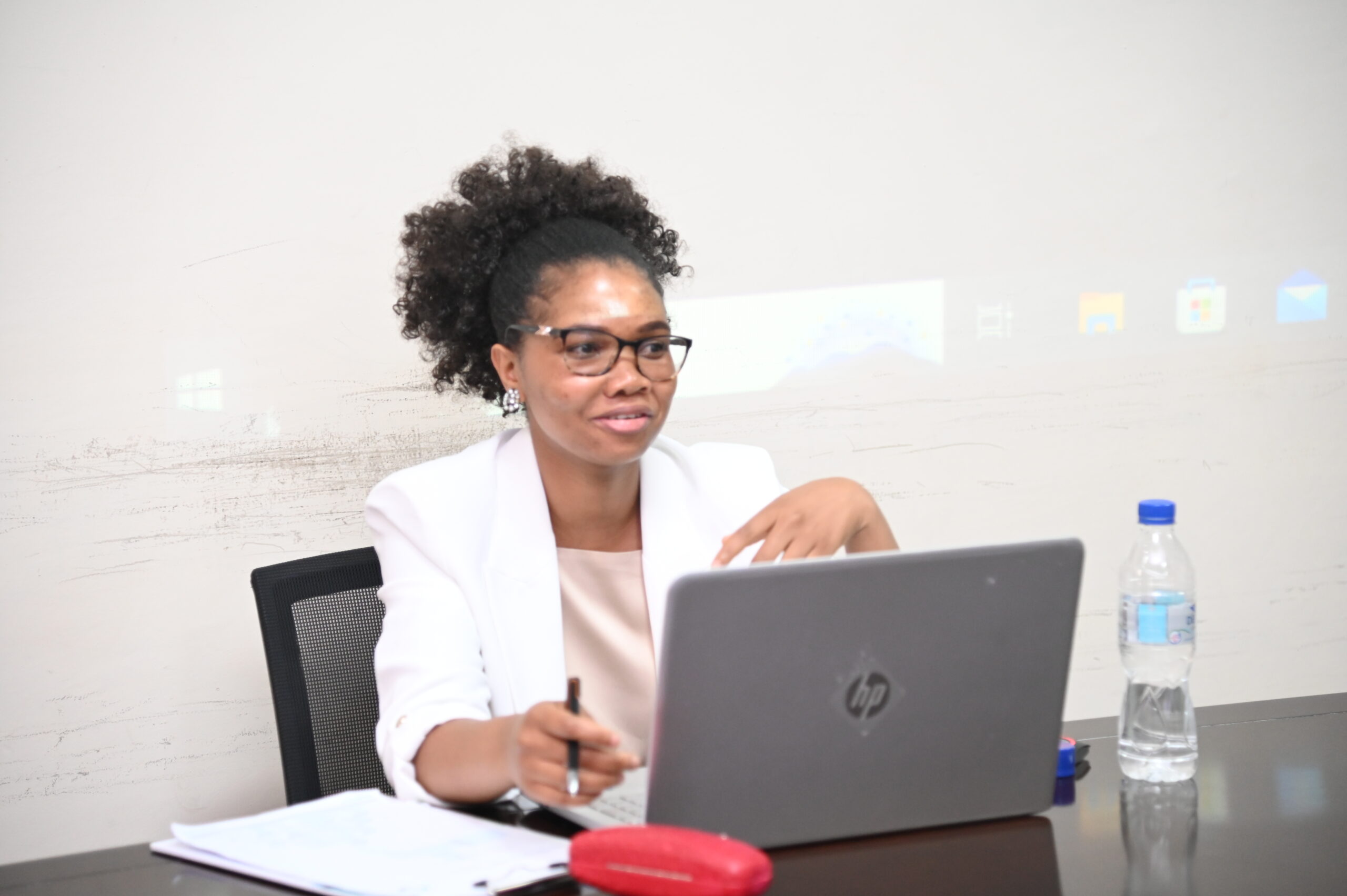
Dr. Thandile stated the city of Addis Ababa has been urbanizing and expanding faster at an accelerated rate. Notable in this phase is the increased water pollution, contributing to water availability and quality issues within the city. Her study examines the impact of urban growth and climate change on surface water availability and quality in Addis Ababa city, Ethiopia. The impacts of land use/land cover dynamics and climate change on water quality and hydrology in the city were evaluated. Underlying causes of Addis Ababa’s water supply and quality issues and the residents’ willingness to pay for the improvement of the water supply system in the city are also quantified using participatory approach methods.
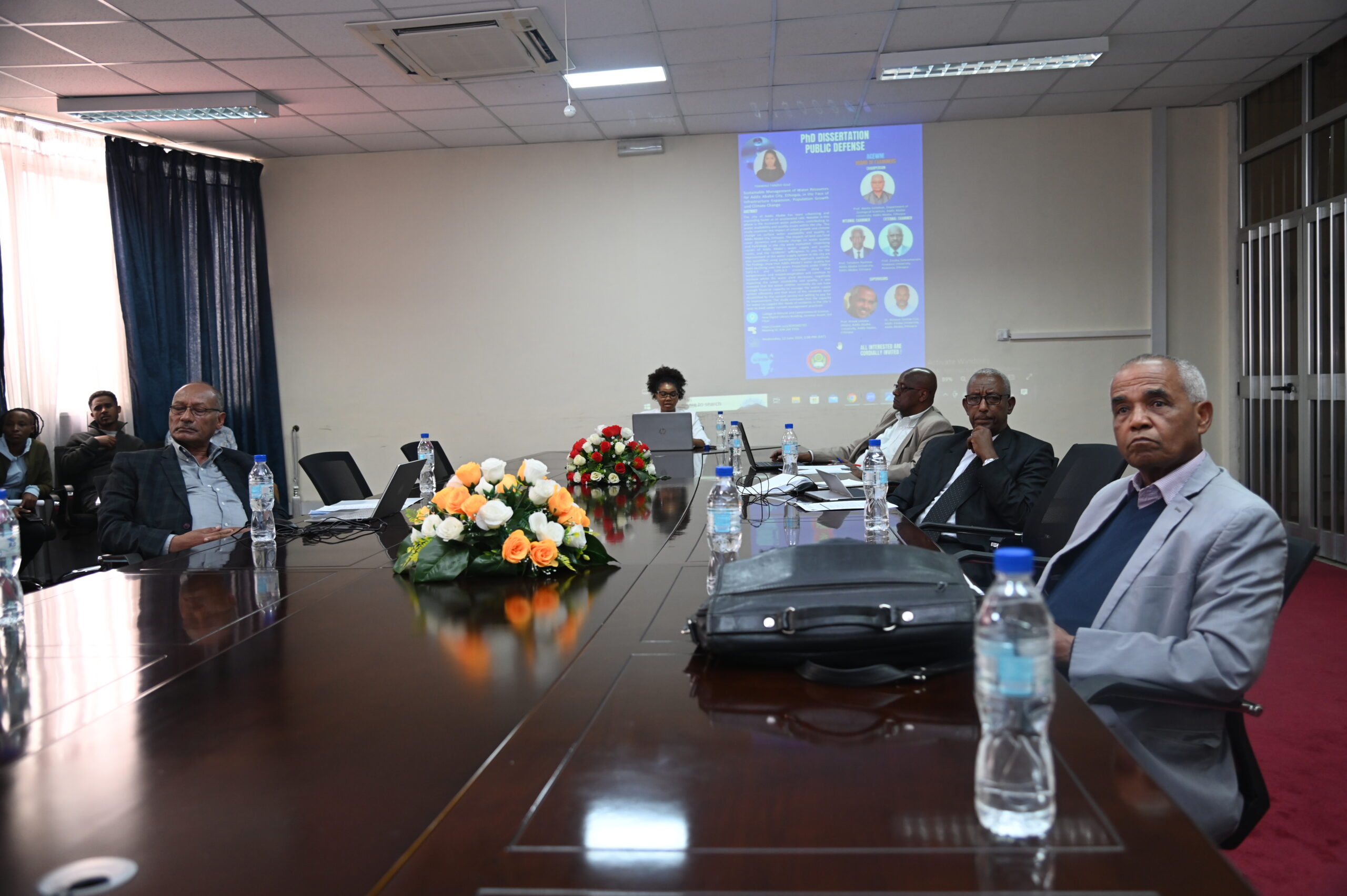
Her finding show that Addis Ababa’s water quality has been declining over the years. Projections under CMIP 6 SSP2-4.5 and SSP5-8.5 scenarios show that temperatures and evapotranspiration will continue to increase whilst the water yield decreases, negatively impacting the water availability and quality. It was revealed that the water utilities currently do not have enough financial capacity to manage the water supply system efficiently and that most of the residents were dissatisfied by the current service but willing to pay for its improvement. The study concludes that the capacity for water to support the needs of residents in the city is near its limit under current management practices.
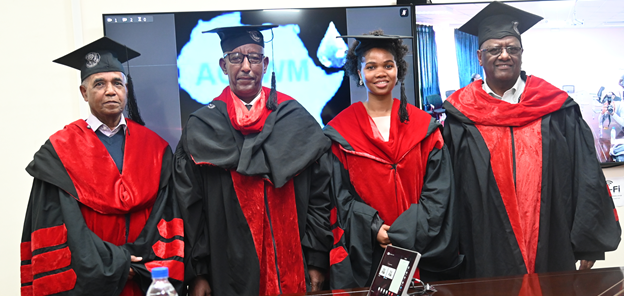
Prof. Abebe Getahun,was the chairperson of the defense session of this dissertation. The dissertation was mainly supervised by Prof. Brook Lemma from Addis Ababa University where as Dr. Binyam Tesfaw similarly from Addis Ababa University, was Co-supervisor. Prof. Tenalem Ayenew from Addis Ababa University and Prof. Zinabu Gebremariam from Hawassa University, were internal and external examiners respectively.
SHIMELASH MOLLA HAS SUCCESSFULLY DEFENDED HIS PHD DISSERTATION
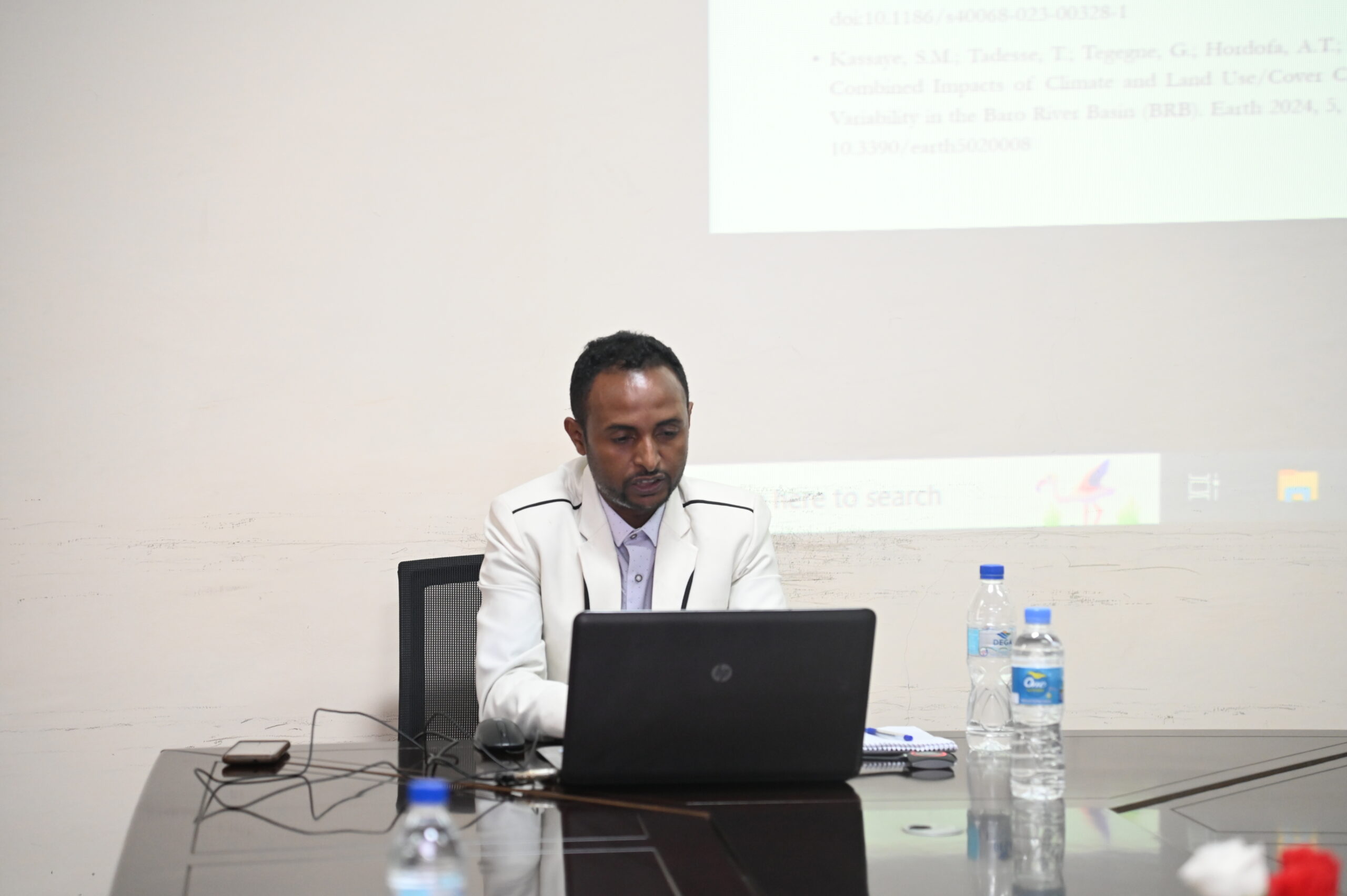
The title of his PhD dissertation is evaluating the Hydrological Dynamics under Land Use/Cover, Topography and Climate Change in the Baro River Basin, Ethiopia.
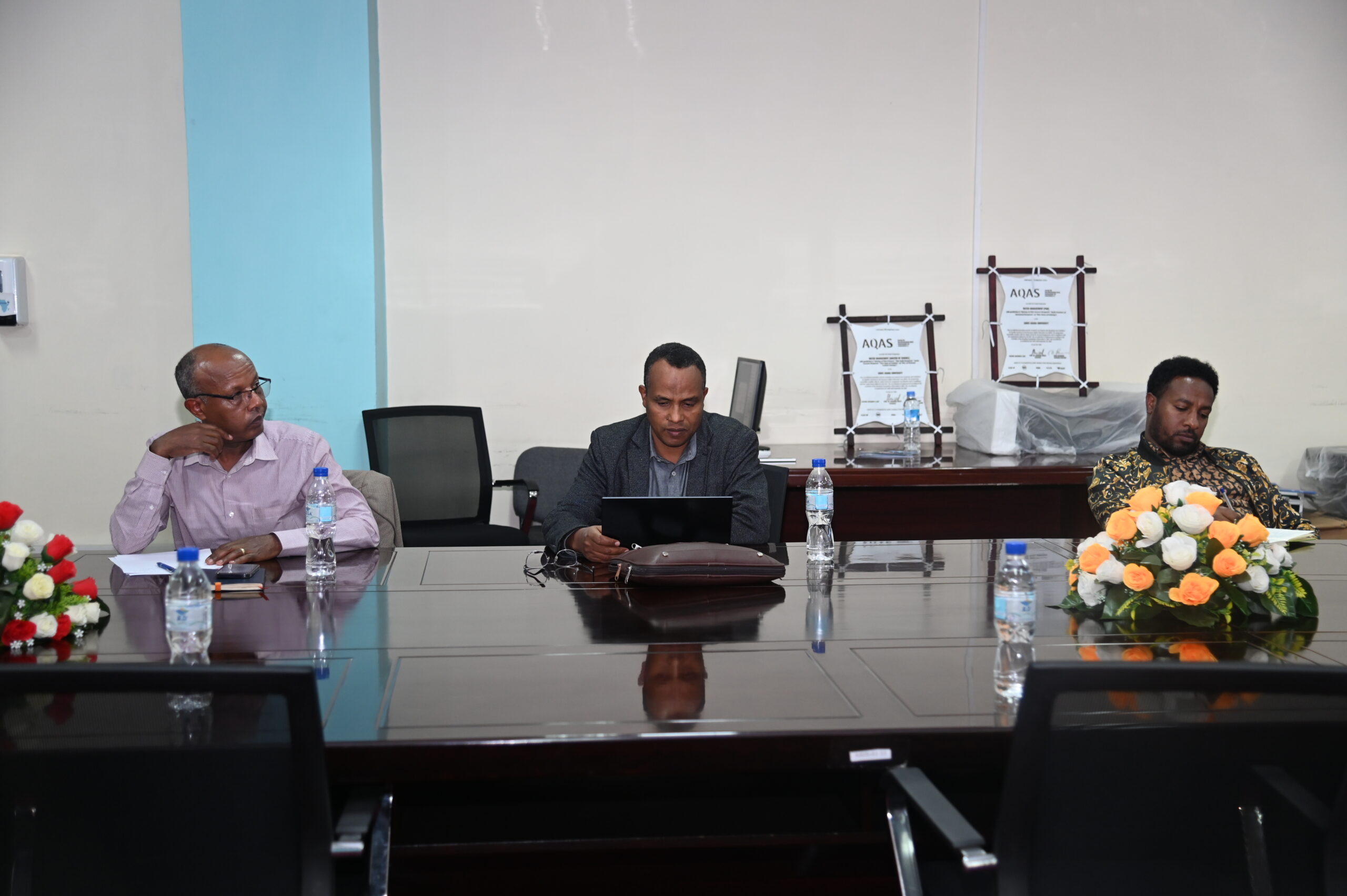
Dr Shimelash’s Dissertation stated Hydrological dynamics in the Baro River Basin are profoundly influenced by land use/cover changes and climate variability. The study examined the complex interactions between lands use/cover, topography, and climate change on hydrological dynamics in the basin. The sensitivity of meteorological dynamics to catchment characteristics is assessed, and the integrated impact of land use and topography on hydrological extremes is evaluated. In addition Climate change impacts on hydrological extremes are quantified, and the relative and combined impact of climate and land use/cover change on streamflow variability is examined.
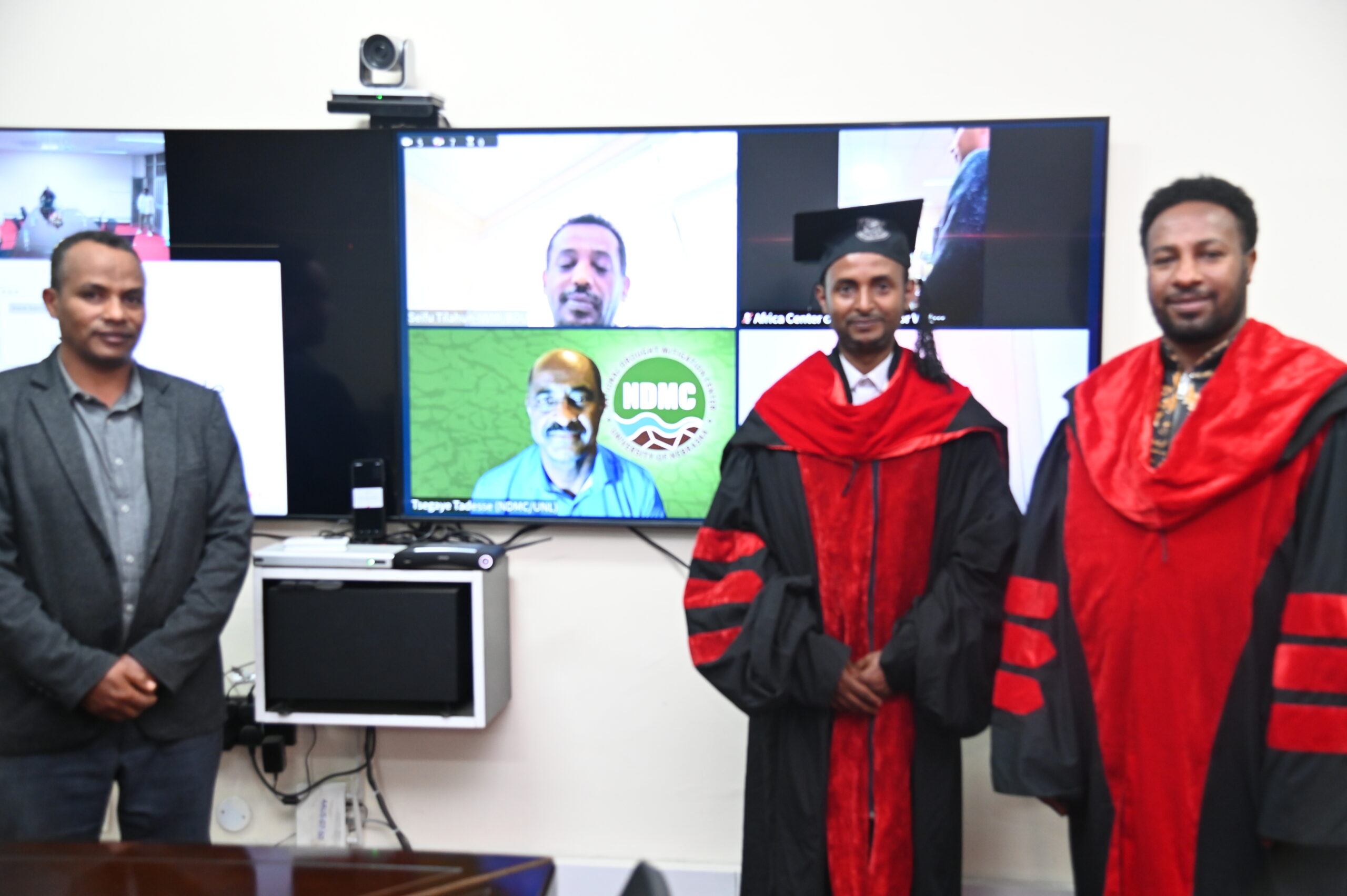
The study finds that precipitation dynamics are more sensitive to land use/cover change, while temperature dynamics are more sensitive to elevation difference. Climate change simulations reveal significant shifts in projected annual maximum and minimum flows, with earlier occurrences under SSP2-4.5 and later occurrences under SSP5-8.5. The study concludes that climate change outweighs the land use/cover impact in the Basin, emphasizing the importance of location-specific assessments.
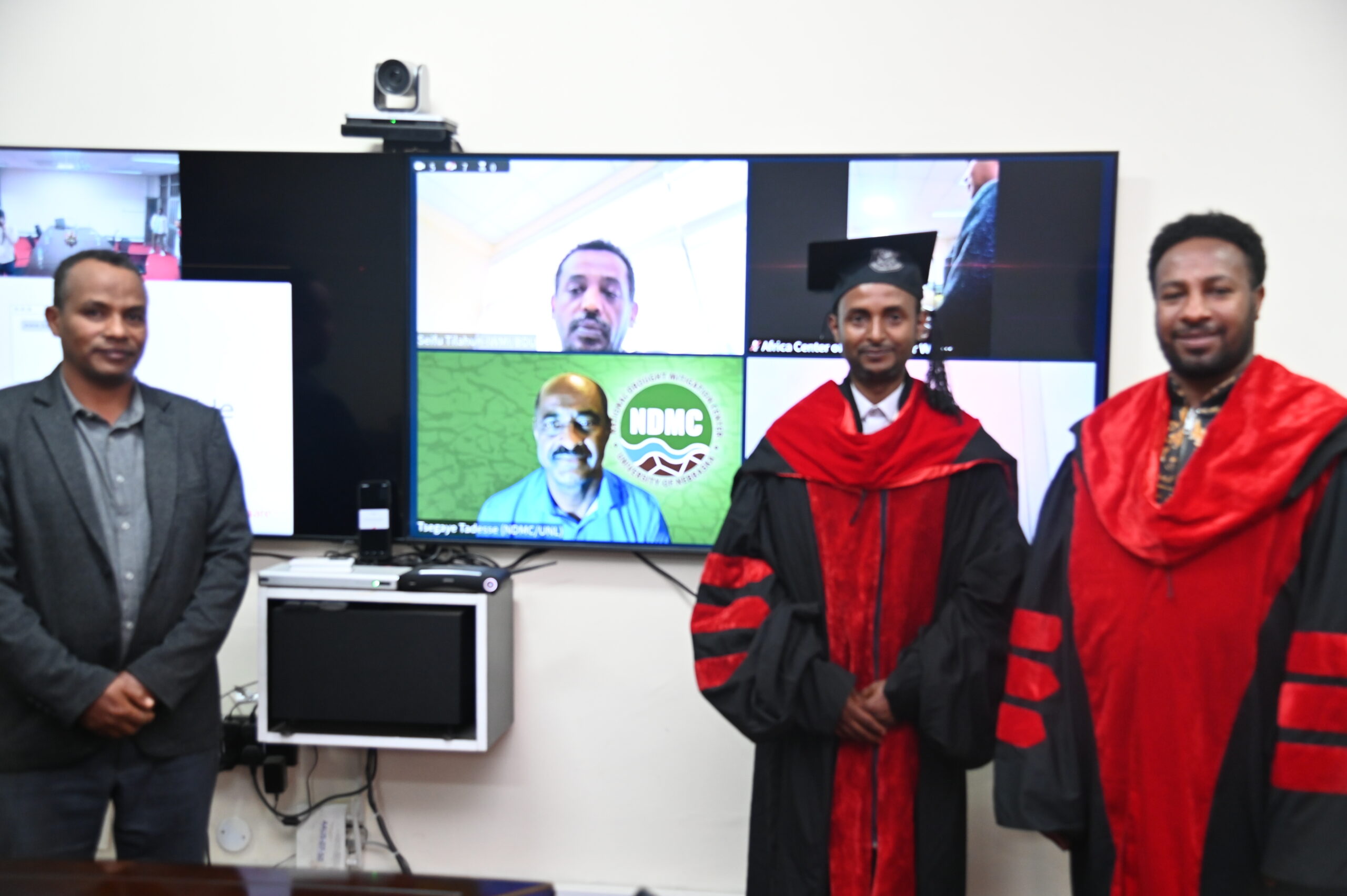
Prof. Feleke Zewge was the chairperson of the defense session of this dissertation. The dissertation was mainly supervised by Prof. Tsegaye Tadesse from University of Nebraska-Lincoln, Nebraska, USA whereas Dr. Getachew Tegegne from Addis Ababa Science and Technology University was Co-supervisor. Dr. Dessie Nedaw from Addis Ababa University and Prof. Seifu Admassu from Bahir Dar University, were internal and external examiners respectively.


